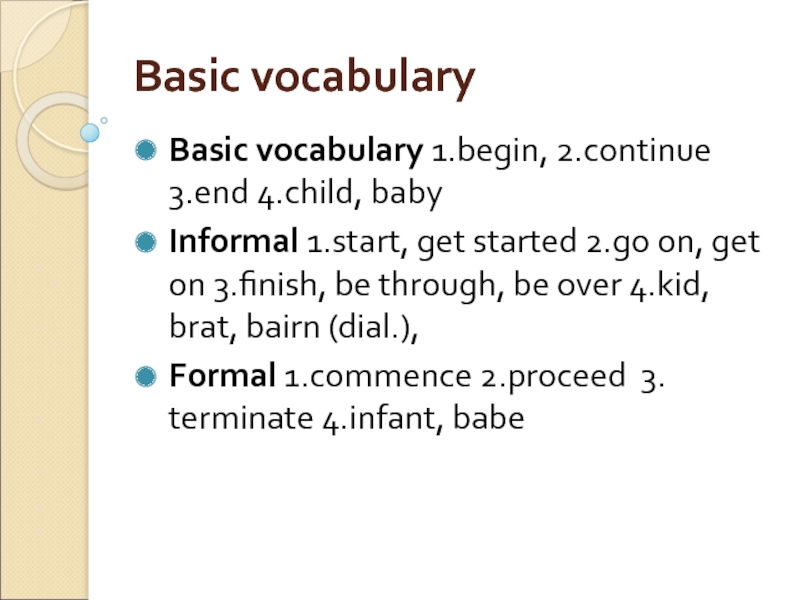Word
is the principal and basic unit of the language system, the
largest
on the morphologic and the smallest on the syntactic plane of
linguistic
analysis.
It
has been universally acknowledged that a great many words have a
composite
nature and are made up of morphemes.
The
four types (root words, derived words, compound, shortenings)
represent the
main
structural types of Modern English words.
According
to the number of morphemes words can be classified into
monomorphic
and polymorphic. Monomorphic
or root-words consist of
only one
root-morpheme,
e.g. small, dog, make, give, etc. All polymorphic
word fall
into
two subgroups: derived words and compound words – according to
the
number
of root-morphemes they have. Derived
words
are composed of one root-
morpheme
and one or more derivational morphemes, e.g. acceptable, outdo,3
disagreeable,
etc. Compound
words
are those which contain at least two root-
morphemes,
the number of derivational morphemes being insignificant. There
can
be both root- and derivational
morphemes in compounds
as in pen-holder,
light-mindedness,
or only root-morphemes as in lamp-shade, eye-ball, etc.
-
Synchronic and Diachronic Study of Vocabulary.
There
are two principle approaches in linguistic science to the study of
language material : synchronic & diachronic . With regard to
Special lexicology the synchronic
approach is concerned with the
vocabulary of a language as it exists at a given time . Its Special
Descriptive lexicology that deals with the vocabulary &
vocabulary units of a particular language at a certain time . The
diachronic approach in terms of Special
lexicology deals with the changes & the development of vocabulary
in the coarse of time . It is Special Historical lexicology that
deals with the evaluation of the vocabulary units of a language as
the time goes by . The two approaches shouldnt be set one against
the other . In fact , they are interconnected & interrelated
because every linguistic structure & system exists in a state of
constant development so that the synchronic state of a language
system is a result of a long process of linguistic evaluation , of
its historical development .
-
Paradigmatic and Syntagmatic Relations between Words.
Syntagmatics –
linear (simultaneous) relationship of words in speech as distinct
from associative (non-simultaneous) relationship of words in
language.
Paradigmatics –
1) associative relationship of words in language as distinct from
linear (simultaneous) relationship of words in speech (syntagmatics);
relation of units in absentia (e.g. synonymic, antonymic
relationships); 2) an approach to language when the elements of its
system are regarded as associated units joined by oppositional
relationship.
Basic
linguistic
relationships which describe
the complex structure of a language system. Paradigmatic
relationships between linguistic elements can be established by use
of the substitution
test at the
vertical level.
Thus the initial consonants in beer,
deer, peer form a paradigmatic class,
as well as words such as
today
and tomorrow
in the sentence: She will arrive
today/tomorrow. Syntagmatic
relationships are defined by the ability of elements to be combined
horizontally (linearly), e.g. the
relationship between She
will arrive and today.
De Saussure (1916) called paradigmatic relationships ‘associative’
relationships, because they represent the relationship between
individual elements in specific environments with such elements in
the memory which can potentially replace them. Paradigmatic
relationships are based on the criteria of selection and distribution
of linguistic elements, and are, for example, the basis for
establishing the phoneme
inventory of a
language through the construction of minimal
pairs,
the replacement of sounds in an otherwise constant environment that
leads to a difference in meaning. Elements which are related to each
other paradigmatically can potentially occur in the same context but
are mutually exclusive in an actual
concrete context because they stand in opposition
to one another. The distinction between paradigmatic and syntagmatic
relationships is relevant to all levels of description; cf. in
semantics
the paradigmatic semantic
relations (such as
synonymy
and antonymy)
vs the syntagmatic relations between lexemes in selectional
restrictions
Соседние файлы в предмете [НЕСОРТИРОВАННОЕ]
- #
- #
- #
- #
- #
- #
- #
- #
- #
- #
- #
Denote main characteristics of words.
The modern approach to word studies is based on distinguishing between the external and the internal structures of the word.
When we consider the “external structure” of the word, we mean its morphological structure. For instance, in the word post-impressionists the following morphemes can be distinguished: the prefix: post-, im-, the root press, the noun-forming suffixes -ion, -ist, and the grammatical suffix of plurality -s. All these morphemes constitute the external structure of the word post-impressionists
We will study the external structure of words, and also typical word-formation patterns in the session on word-building.
The internal structure of word, or its meaning, is nowadays commonly referred to as the word’s semantic structure.
This is certainly the word’s major aspect. Word can serve the purposes of human communication solely due to their meanings, and it is the most unfortunate when this fact is ignored by some contemporary scholars who, in their obsession with the fetish of structure, tend to condemn as irrelevant anything that eludes mathematical analysis. And this is exactly what meaning, with its subtle variation and shifts, is apt to do.
The area of lexicology specializing in the semantic studies of the word is called semantics. Another structural aspect of the word is sometimes inaccurately interpreted as indivisibility. The example of post-impressionists has already shown that the word is not, strictly speaking, indivisible.
Its component morphemes are permanently linked together in opposition to word-groups, both free and with fixed contexts, whose components possess a certain structural freedom, example bright light, to take for granted .
A further structural feature of the word is its susceptibility to grammatical employment. In speech most words can be used in different grammatical forms in which their interrelations are realized.
So far we have only underlined the word main peculiarities, but this suffices to convey the general idea of the difficulties and questions faced by the scholars attempting to give a detail definition of the word.
The difficulty does not merely consist in the considerable number of aspects that are to be taken into account, but, also in the essential unanswered questions of word theory which concern the nature of its meaning.
All that we have studied the word can be summed up as follows:
The word is a speech unit used for the purposes of human communication, materially representing a group of sounds, possessing a meaning, susceptible to grammatical employment and characterized by formal and semantic unity.
1. LECTURE 2 CHARACTERISTICS OF THE WORD AS THE BASIC UNIT OF THE LANGUAGE www.philology.bsu.by/кафедры/кафедра английского языкознания/учебные материалы/кафедра английского языкозн
LEXICOLOGY COURSE
LECTURE 2
CHARACTERISTICS OF THE
WORD AS THE BASIC UNIT OF
THE LANGUAGE
www.philology.bsu.by/кафедры/кафедра английского
языкознания/учебные материалы/кафедра английского
языкознания/папки преподавателей/Толстоухова В.Ф.
2. The questions under consideration
A word as a fundamental unit of language.
2. Motivation of words.
3. Functional style.
4. Informal style.
5. Colloquial words.
6. Slang.
7. Dialect words.
8. Learned words.
9. Archaic and obsolete words.
10. Professional terminology.
11. Basic vocabulary.
1.
3. TEST 2
1. Give definitions to the following:
lexical system, syntagmatic relations,
paradigmatic relations, a word,
motivation, phonetic motivation,
morphological motivation, semantic
motivation, folk etymology, colloquial
words, slang, dialect words, archaic and
obsolete words, professional
terminology, basic vocabulary.
4. Complete the following sentences using words and expressions given in the list below:
A. The smallest meaningful units of the
language are called … .
B. The biggest units of morphology and the
smallest units of syntax are … .
С. A set of elements associated and functioning
together according to certain laws is termed …
.
D. Contrastive relations of a lexical unit with all
other units that can occur in the same context
and be contrasted to it are known as … .
5. 2.Complete the following sentences using words and expressions given in the list below:
E. When there is a certain similarity between the
sounds that make up words and their meaning, the
motivation is … .
P. Morphological motivation, when both the lexical
meaning of the component morphemes and the
meaning of the pattern are perfectly transparent, is
called … .
G. Motivation based on the co-existence of direct and
figurative meaning of the same word within the same
synchronous system is termed … .
1) lexical system; 2) semantic; 3) paradigmaticс
relations; 4) complete; 5) words; 6) phonetical; 7)
morphemeв.
6. 3. Answer these questions
1.
2.
3.
4.
5.
6.
What determines the choice of stylistically
marked words in each particular situation?
In what situations are informal words used?
What are the main kinds of informal words?
Give a brief description of each group.
What is the difference between
colloquialisms and slang? What are their
common features? Illustrate your answer
with examples.
What are the main features of dialect words?
Where are formal words used?
7. 3. Answer these questions
1.
2.
3.
4.
5.
6.
Are learned words used only in books? Which type of
learned words, do you think, is especially suitable for
verbal communication? Which is least suitable and
even undesirable?
What are the principal characteristics of archaic
words?
What are the controversial problems connected with
professional terminology?
Do you think that students of English should learn
terms? If so, for which branch or branches of
knowledge?
What is understood by the basic vocabulary?
Which classes of stylistically marked words should
be included in the students’ functional vocabulary?
8. 1.A word as a fundamental unit of language.
The term system (definition)
9. The term system
denotes a set of elements associated and
functioning together according to certain
laws.
10. The lexical system of every epoch
contains
productive
elements typical of
this particular period
others that are
archaic and are
dropping out of
usage
some new
phenomena,
neologisms
11. The elements of lexical system
are characterized
by their
combinatorial and
contrastive
properties
determining their
syntagmatic and
paradigmatic
relationships.
12. EXAMPLE
compare the meaning of the verb «to get»
in the sentences
He got a letter.
He got tired
He got to London.
He could not get the piano through the
door.
13. On the syntagmatic level,
the semantic structure of the word is
analysed in its linear relationships with
neighbouring words in connected
speech. In other words, the semantic
characteristics of the word are observed,
described and studied on the basis of its
typical contexts.
14. Paradigmatic contrastive relations
Where do they exist ?
Example:
to go a mile
to run a mile
to walk a mile
To stroll a mile
15. Paradigmatic contrastive relations
exist between words belonging to one
subgroup of vocabulary items (e.g.,
verbs of motion, of sense perception,
sets of synonyms, etc.) that can occur in
the same context and be contrasted to
one another. Paradigmatic relations are
observed in the system of language.
16. On the paradigmatic level
the word is studied in its relationships
with other words in the vocabulary
system.
So, a word may be studied in comparison
with other words of similar meaning.
17. work n – labour n.
Work работа, труд; 1 the job
that a person does especially
in order to earn money. This
word has many meanings (in
Oxford Dictionary – 14), many
synonyms and idioms
[`idiemz]: creative work
творческая деятельность;
public work общественные
работы; his life`s work дело
его жизни; dirty work
(difficult, unpleasant) 1
чёрная работа; 2 грязное
дело, подлость. Nice work!
Отлично! Здорово! Saying
(поговорка): All work and no
play makes Jack a dull boy
labour – 1 work, especially
physical work: manual labour,
a labour camp –
исправительно-трудовой
лагерь; 2 people who work: a
shortage of labour; cheap
labour; skilled labour –
квалифицированные
рабочие, Labour Party; labour
relations; a labour of Sisyphus;
Sisyphean labour [,sisi‘fi:en]
сизифов труд; тяжёлый и
бесплодный труд – of a task
impossible to complete
18. On the paradigmatic level
words of similar
meaning
e.g. to refuse v – to
reject v
of opposite meaning
(e.g. busy adj – idle
adj;
to accept v – to reject
v)
19. On the paradigmatic level
of different stylistic characteristics
(e.g. man n – chap n – bloke n – guy n).
Man – chap (coll.) – парень, малый; a good chap –
славный малый; old chap – старина; chap – BrE,
informal, becoming old-fashioned – used to talk about
a man in a friendly way: He isn`t such a bad chap really.
Bloke (coll.) тип, парень: He seemed like a nice bloke.
Guy – coll. US – малый; tough guy железный малый;
wise guy умник; guys (informal, especially US) a group
of people of either sex: Come on, you guys!
20. The main problems of paradigmatic studies
are synonymy,
antonymy,
functional styles.
21. Words vs Morphemes
the central elements of
language system
the biggest units of
morphology
the smallest units of
syntax
can be separated in an
utterance
can be used in isolation
as a complete utterance
is composed of one or
more morphemes
are also meaningful
units
can not be used
independently
are always parts of
words
cannot be divided into
smaller meaningful
words
22. Why is the definition of a word the most difficult?
The simplest word has many different
aspects:
• a sound form and morphological
structure;
• may occur in different word-forms,
different syntactic functions
• signal various meanings
23. Why is the definition of a word the most difficult?
the word is a sort of focus for the
problems of
phonology,
lexicology,
syntax,
morphology
sciences that have to deal with language
and speech, such as philosophy and
psychology
24. The definition of a word
The word has been defined semantically,
syntactically, phonologically and by
combining various approaches.
25. The definition of a word
Many eminent scholars such as V.V.
Vinogradov, A.I. Smirnitsky, O.S.
Akhmanova, M.D. Stepanova, A.A.
Ufimtseva contributed to creating a word
theory. It is based upon the
understanding of the relationship
between word and thought, on the one
hand, and language and society, on the
other.
26. The definition of a word
A word is the smallest unit of a given
language capable of functioning alone
and characterised by positional mobility
within a sentence, morphological
uninterruptability and semantic
integritу.
27. The definition of a word
«a word is defined by the association of a
particular meaning with a particular
group of sounds capable of a particular
grammatical employment.» (A. Meillet.
Linguistique historique et linguistique
generate. Paris, 1926. V. 1. P. 30.)
28. 2. Motivation of words.
The term mоtivation is used to denote
the relationship existing between the
phonemic or morphemic composition
and structural pattern of the word, on the
one hand, and its meaning, on the other.
29. Three types of motivation
phonetical motivation,
morphological motivation
semantic motivation
30. What motivation is it?
e.g., bump,
buzz,
chatter,
clatter,
giggle,
hiss,
whistle, etc.
31. The phonetical motivation is
when there is a certain similarity
between the sound that make up words
and their meaning.
32. morphological motivation
The main criterion in morphological
motivation is the relationship between,
morphemes.
e.g., «endless” is completely motivated
as both the lexical meaning of the
component morphemes and the
meaning of the pattern are perfectly
transparent.
33. morphological motivation
«cranberry» is only partially motivated
because of; the absence of the lexical
meaning in the morpheme «cran-«.
The words «matter», «repeat» are nonmotivated because the connection
between the structure of the lexical unit
and its meaning is completely
conventional.
34. Semantiс motivation
is based on the co-existence of direct and
figurative meaning of the same word
within the same synchronous system.
E.g., «mouth» denotes a part of a human
face and can be metaphorically applied to
any opening: the mouth of a river, the
mouth of a furnace, mouth of pipe.
35. Semantiс motivation
Semantic motivation is clear in popular
names of flowers, plants and birds
violet,
bluebell,
bluebottle,
blackcap,
blackbird,
nightingale,
hummingbird, etc.
36. Semantiс motivation
As to compounds their motivation is
morphological if the meaning of the
whole is based on the direct meaning of
the components (e.g., headache — pain in
the head), and semantic if the
combination of components is used
figuratively (headache — anything or
anyone very annoying).
37. fоlk etуmоlogy (popular etymology, false etymology)
E.g. «mushroom” from French
«moucheron» has nothing in common
with «room» (a borrowed word)
38. 3. Functional style (definition)
”a system of expressive means peculiar to
a specific sphere of communication”.
(I.V. Arnold )
The suitability or unsuitability of a word for
each particular situation depends on its
stylistic characteristics or, in other words,
on the functional style it represents.
39. Functional style (definition)
A system of expressive means peculiar to a
specific sphere of communication.
By the sphere of communication scholars
mean the circumstances attending the
process of speech in each particular case:
professional communication, a lecture,
an informal talk, a formal letter, an
intimate letter, a speech in court, etc.
40. Subdivisions of spheres of communications
formal (a lecture, a speech in court, an
official letter, professional
communication)
informal (an informal talk, an intimate
letter).
41. 4. Informal style (where?)
Informal vocabulary is used in one’s
immediate circle: family, relatives, or
friends. One uses informal words when at
home or feeling at home.
42. Informal style (characteristics)
relaxed,
free-and-easy
familiar
43. the informal talk differs
well-educated
people
adults (the choice of
words)
people living in cities
the illiterate or the
semi-educated
teenagers
people living in the
provinces
(regional words and
expressions)
44. The choice of words
is determined not
only by informal and
formal situations
but by
speaker’s
educational
background
speaker’s cultural
background
age group
occupational and
regional
characteristics
45. three types of informal words
colloquial
slang
dialect words and word-groups
46. 5. Colloquial words (Where? By whom?)
in everyday conversational speech both
by cultivated and uneducated people of
all age groups.
47. literary colloquial words
appear in dialogues in which they
realistically reflect the speech of modern
people
appear in descriptive passages as well
(in modern fiction)
48. examples of literary colloquial words
Pal (кореш, друг) and chum (приятель,
дружок) are colloquial equivalents of
friend; girl, when used colloquially,
denotes a woman of any age;
bite and snack (quick meal – перекусить)
stand for meal;
hi, hello are informal greetings, and so
long a form of parting;
start, go on, finish and be through
(покончить)
49. examples of literary colloquial words
A considerable number of shortenings
are found among words of this type.
E.g. pram, exam, fridge, flu, zip, movie.
Verbs with post-positional adverbs are
also numerous among colloquialisms:
E.g. put up, put over, make up, make out,
turn up,
50. literary colloquial words (are to be distinguished from)
familiar colloquial words (by the young
and the semi-educated )E.g. doc (for
doctor), ta-ta (for good-bye), to kid
smb.(for tease, banter – подшутить), to
pick up smb. (for make a quick and easy
acquaintance), shut up (for keep silent).
Low colloquial (просторечие)
(uncultivated people).
51. 6.Slang
The Oxford English Dictionary defines
slang as “language of a highly colloquial
style, considered as below the level of
standard educated speech, and
consisting either of new words or of
current words employed in some special
sense.”
52. Slang
All or most slang words are current words
whose meanings have been
metaphorically shifted. Each slang
metaphor is rooted in a joke, but not in a
kind or amusing joke. This is the criterion
for distinguishing slang from
colloquialisms: most slang words are
metaphors and jocular, often with a
coarse, mocking, cynical colouring.
53. Slang (the main reasons to use?)
To be picturesque,
To be arresting,
To be striking
To be different from others.
To demonstrate one’s spiritual
independence and daring.
To sound “modern” and “up-to-date”.
54. Slang (who are users?)
The circle of users of slang is more narrow
than that of colloquialisms.
It is mainly used by the young and
uneducated.
55. 7.Dialect words
dialects are regional forms of English
Dialect is a variety of a language which
prevails in a district, with local
peculiarities of vocabulary, pronunciation
and phrase.
(e.g. the Lancashire, Dorsetshire, Norfolk
dialects).
56. Dialect words are constantly being incorporated into
everyday colloquial speech or slang
into the common stock (words which are
not stylistically marked)
a few of them even into formal speech
into the literary language
e.g.Car, trolley, tram began as dialect
words.
57. Dialect words (examples)
tha (thee) – the objective case of thou;
brass – money;
nivver – never;
nowt – nothing.
58. 8. Learned words (two main groups):
words associated with professional
communication
associated with the printed page. It is
in this vocabulary stratum that poetry
and fiction find their main resources.
59. Learned words (further subdivision)
We find here numerous words that are
used in scientific prose and can be
identified by their dry, matter-of-fact
flavour (e.g. comprise, experimental,
heterogeneous, homogeneous, conclusive,
divergent, etc).
60. Learned words
‘officialese’ (канцеляризмы). These are
the words of the official, bureaucratic
language. They should be avoided in
speech and in print, e.g. assist (for help),
endeavour (for try), proceed (for go),
approximately (for about), sufficient (for
enough), inquire (for ask).
61. Learned words (further subdivision)
the words found in descriptive passages
of fiction. These words, which may be
called ‘literary’, also have a particular
flavour of their own, usually described as
‘refined’. They are mostly polysyllabic
words drawn from the Romance
language and, though fully adapted to
the English phonetic system, some of
them continue to sound singularly
foreign.
62. Learned words
Here are some examples:
solitude=loneless, lonely place
(уединение, одиночество),
sentiment=feeling (чувство),
fascination=strong attraction
(очарование, обаяние), delusion
(заблуждение), meditation
(размышление), cordial=friendly
(сердечный, радушный).
63. Learned words (further subdivision)
There is one further subdivision of
learned words: modes of poetic diction.,
Poetic words have a further characteristic
– a lofty, sometimes archaic, colouring:
64. Examples of poetic words
“Alas! (увы) they had been friends in youth;
But wispering tongues can poison truth
And constancy (постоянство) lives in
realms (царства) above;
And life is thorny; and youth is vain…
65. Learned words (not only in printed page)
Though learned words are mainly
associated with the printed page, this is
not exclusively so. Any educated Englishspeaking individual is sure to use many
learned words not only in his formal
letters and professional communication
but also in his everyday speech. Educated
people in both modern fiction and real
life use learned words quite naturally and
their speech is richer for it.
66. Learned words
But on the other hand, utterances
overloaded with such words are absurd
and ridiculous.
67. Learned words and Writers
Writers use this phenomenon for stylistic
purposes. When a character in a book or
in a play uses too many learned words,
the obvious inappropriateness of his
speech in an informal situation produces
a comic effect.
68. Learned words
However any suggestion that learned
words are suitable only for comic
purposes, would be quite wrong. It is in
this vocabulary stratum that writers and
poets find their most vivid paints and
colours, and not only their humorous
effects.
69. Learned words
It is also true that some of these words
should be carefully selected and
“activized” to become part of the
students’ functional vocabulary.
Without knowing some learned words, it
is even impossible to read fiction (not to
mention scientific articles) or to listen to
lectures in the foreign language.
70. 9.Archaic and obsolete words
Archaic – are old and no longer used
words;
obsolete – no longer used because
something new was invented. Obsolete
words have completely gone out of use.
71. Archaic words
are restricted to the printed page. These
words are already partly or fully out of
circulation. They are used in historical
novels and in poetry which is rather
conservative in its choice of words.
Thou [θаu] – (ты) and thy [ðai] – (твой),
aye [ai] – (‘yes’) and nay [nei] – (‘no’) are
certainly archaic and long since rejected
by common usage, yet poets use them
even today.
72. Archaic words
Numerous archaisms can be found in
Shakespeare, but it should be taken in
consideration that what appear to us
today as archaisms in the works of
Shakespeare, are in fact examples of
everyday language of Shakespeare`s
time.
Further examples of archaisms are: morn
(for morning), eve (for evening), errant
(for wandering, e.g. errant knights), etc.
73. Archaic words
Sometimes an archaic word may undergo
a sudden revival. So, the formerly archaic
kin (for relatives; one`s family) is now
current in American usage.
74. 10.Professional terminology
Every field of modern activity has its
specialized vocabulary, and similarly
special terminologies for psychology,
music, management, finance, economics,
jurisprudence, linguistics and many
others.
75. Professional terminology
Term, as traditionally understood, is a
word or a word-group which is
specifically employed by a particular
branch of science, technology, trade or
the arts to convey a concept peculiar to
his particular activity.
76. Professional terminology
So, share, bank, balance sheet are finance
terms;
court, lawyer, civil law are legal terms;
and top manager, creative team,
motivation are used in management.
Bilingual, interdental, labialization,
palatalization, glottal stop, descending
scale are terms of theoretical phonetics.
77. controversial problems in the field of terminology.
a term loses its terminological status
It is quite natural that under
circumstances numerous terms pass into
general usage without losing connection
with their specific fields.
78. Professional terminology
There are linguists in whose opinion terms are
only those words which have retained their
exclusiveness and are not known or recognized
outside their specific sphere. From this point of
view, words associated with the medical
sphere, such as unit (доза лекарственного
препарата), theatre (операционная), contact
(носитель инфекции) are no longer medical
terms as they are in more or less common
usage.
79. Professional terminology
There is yet another point of view,
according to which any terminological
system is supposed to include all the
words and word-groups conveying
concept peculiar to a particular branch of
knowledge, regardless of their
exclusiveness. It would be wrong to
regard a term as something “special” and
standing apart.
80. polysemy and synonymy
According to some linguists, an “ideal”
term should be monosemantic (i.e. it
should have only one meaning).
Polysemantic terms may lead to
misunderstanding, and that is a serious
shortcoming in professional
communication. This requirement seems
quite reasonable, yet facts of the
language do not meet it. There are
numerous polysemantic terms.
81. synonymy
The same is true about synonymy in
terminological systems. There are
scholars who insist that terms should not
have synonyms because, consequently,
scientists and other specialists would
name the same objects and phenomena
in their field by different terms and would
not be able to come to any agreement.
This may be true. But, in fact, terms do
possess synonyms.
82. 10.Basic vocabulary
are stylistically neutral,
used them in all kinds of situations, both
formal and informal, in verbal and written
communication
are used every day, everywhere and by
everybody, regardless of profession,
occupation, educational level, age group
or geographical location.
83. Basic vocabulary
without them no human communication
would be possible as they denote objects
and phenomena of everyday importance
(e.g. house, bread, summer, child, mother,
difficult, to go, etc.).
is the central group of the vocabulary, its
historical foundation and living core.
84. Basic vocabulary
Basic vocabulary words can be
recognized not only by their stylistic
neutrality but, also, by lack of other
connotations (i.e. attendant meanings).
Their meanings are broad, general and
directly convey the concept, without
supplying any additional information.
85. Basic vocabulary
For instance, the verb to walk means merely ‘to
move from place to place on foot’ whereas in
the meanings of its synonyms to stride
(шагать), to stroll (прогуливаться), to trot
(семенить, бежать вприпрыжку), to stagger
– to sway while walking (идти шатаясь) and
others, some additional information is encoded
as they each describe a different manner of
walking, a different gait, tempo, purpose or
lack of purpose.
86. Basic vocabulary
Basic vocabulary 1.begin, 2.continue
3.end 4.child, baby
Informal 1.start, get started 2.go on, get
on 3.finish, be through, be over 4.kid,
brat, bairn (dial.),
Formal 1.commence 2.proceed 3.
terminate 4.infant, babe
Question
List the 5 characteristics of words. Which one was new to you? Which one do you think is most important? Why? Define “connotative” and “denotative” meanings. What are the steps for performing a word study? How important are word studies in understanding Scripture? Why is it important to do word studies in the original languages instead of in English alone?
Response
Words have several characteristics. William Klein, Craig Blomberg, and Robert Hubbard provide five characteristics of words, and the first characteristic is that words are arbitrary signs that combine sounds and letters to create meaning.[1] Second, words have a range of meaning or semantic range, which simply means that the same exact word can have several different meanings, and third, words reside within a semantic field, which means that many words have similar meanings.[2] Klein, Blomberg, and Hubbard continue by explaining that the fourth characteristic of words is that their meaning changes over time, thus “new meanings develop through usage, and old ones become obsolete.”[3] Finally, the meaning of words extends beyond the denotative or dictionary definition into a connotative meaning, which is the figurative meaning that many words possess.[4]
The newest characteristic of words to me was the distinction between the denotative and connotative meaning. Within an individual’s native language, the difference between denotative and connotative meaning is second nature and often can be overlooked as an exploration of other languages commence. It appears the most important word characteristic may be a word’s semantic range, because without an understanding of the possible Greek or Hebrew meanings within the context of the original audience, it may be impossible to discover the meaning of a word.
Performing a word study requires a minimum of three steps. Scott Duvall and Daniel Hays suggest that the first step is to carefully choose which words to study, and then secondly, determine the semantic range of the word or words selected.[5] The final step is to determine the meaning of the word within its original context.[6] Word studies are extraordinarily important due to word’s flexibility and nuance that can significantly impact the meaning of a particular phrase or verse.
It is difficult to overestimate the importance of word studies in the original languages. In fact, historically, seminaries required Greek and Hebrew for students obtaining a Master of Divinity. A few of the many reasons why word studies in the original languages are important follow. First, concordance work using the English word is of little value because the underlying Greek and Hebrew words are translated into a variety of English words. Accordingly, when looking for other uses of the word, it is a must that the Greek or Hebrew lemma is searched. Second, identifying the grammatical nuances of a verb or noun is difficult and often impossible using the English language. For example, if the interpreter wants to find all the uses of a particular Greek genitive noun or a specific imperfect Hebrew verb, then the word in the original language needs parsed and only then can the researcher search for similar usages. Third, textual criticism is very difficult, if not impossible, without an understanding of the original languages. Fourth, often subtleties of the original language occur that are not identifiable in English. For example, no indefinite article exists in Hebrew or Greek, and the definite article in Greek may or may not connote definiteness, which can effect meaning.[7] A classic example of the importance of articular versus anarthrous nouns is highlighted, according to evangelicals, by the incorrect interpretation of John 1:1 by Jehovah Witnesses, which undermines the deity of Christ.[8] Although the previous reasons are certainly not comprehensive, it is fair to say that doing word studies in the original languages is extraordinarily important to the modern interpreter.
Bibliography
Duvall, J. Scott, and J. Daniel Hays. Grasping God’s Word: A Hands-On Approach to Reading, Interpreting, and Applying the Bible. Grand Rapids: Zondervan, 2012.
Klein, William W., Craig L. Blomberg, and Robert L. Hubbard. Introduction to Biblical Interpretation. Nashville: Thomas Nelson, 2004.
Wallace, Daniel B. The Basics of New Testament Syntax: An Intermediate Greek Grammar. Grand Rapids: Zondervan, 2000.
References
[1] William W. Klein, Craig L. Blomberg, and Robert L. Hubbard, Introduction to Biblical Interpretation (Nashville: Thomas Nelson, 2004), 241.
[2] Ibid., 242–43.
[3] Ibid., 244.
[4] Ibid., 246.
[5] J. Scott Duvall and J. Daniel Hays, Grasping God’s Word: A Hands-On Approach to Reading, Interpreting, and Applying the Bible (Grand Rapids: Zondervan, 2012), 167–77.
[6] Ibid., 177–79.
[7] Daniel B. Wallace, The Basics of New Testament Syntax: An Intermediate Greek Grammar (Grand Rapids: Zondervan, 2000), 94–128.
[8] Ibid., 119–20.
Слайд 1LECTURE 2
CHARACTERISTICS OF THE WORD AS THE BASIC UNIT OF THE
LANGUAGE
www.philology.bsu.by/кафедры/кафедра английского языкознания/учебные материалы/кафедра английского языкознания/папки преподавателей/Толстоухова В.Ф.
LEXICOLOGY COURSE
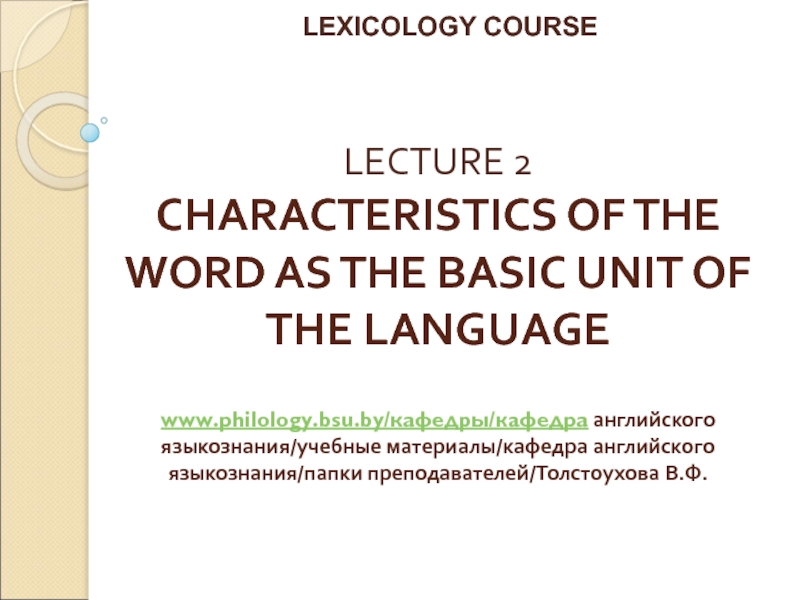
Слайд 2The questions under consideration
A word as a fundamental unit of language.
Motivation
of words.
Functional style.
Informal style.
Colloquial words.
Slang.
Dialect words.
Learned words.
Archaic and obsolete words.
Professional terminology.
Basic vocabulary.
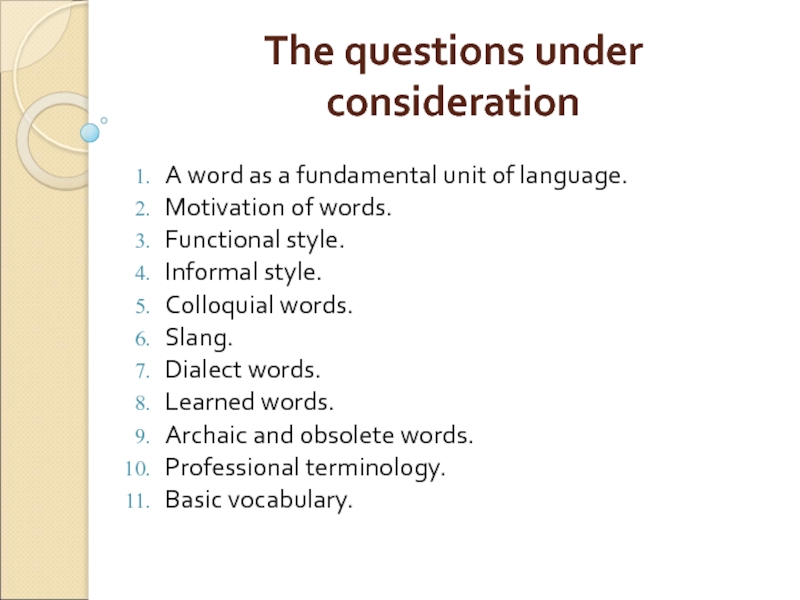
Слайд 3TEST 2
1. Give definitions to the following:
lexical system, syntagmatic relations, paradigmatic
relations, a word, motivation, phonetic motivation, morphological motivation, semantic motivation, folk etymology, colloquial words, slang, dialect words, archaic and obsolete words, professional terminology, basic vocabulary.
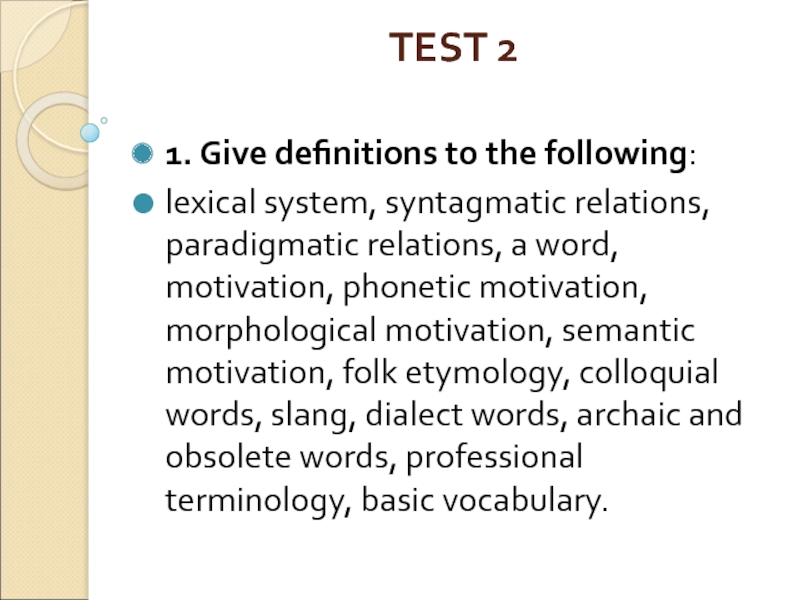
Слайд 4Complete the following sentences using words and expressions given in the
list below:
A. The smallest meaningful units of the language are called … .
B. The biggest units of morphology and the smallest units of syntax are … .
С. A set of elements associated and functioning together according to certain laws is termed … .
D. Contrastive relations of a lexical unit with all other units that can occur in the same context and be contrasted to it are known as … .
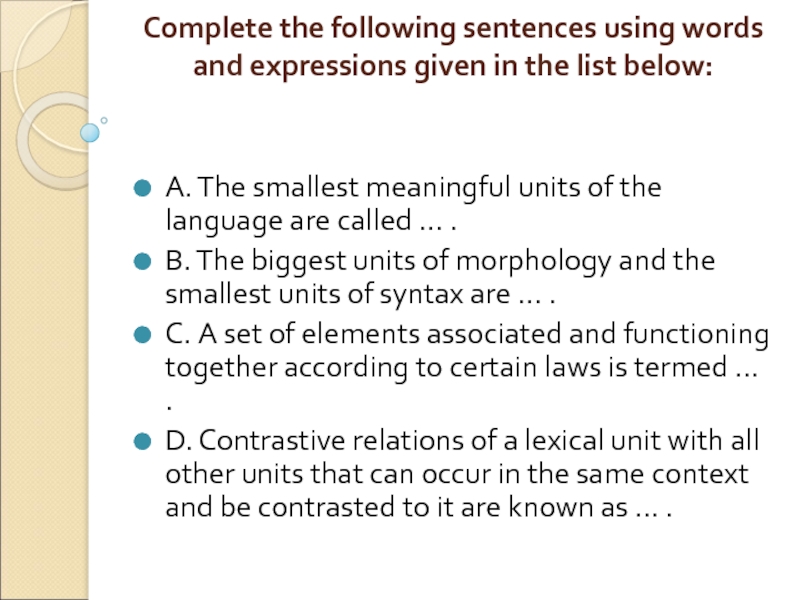
Слайд 52.Complete the following sentences using words and expressions given in the
list below:
E. When there is a certain similarity between the sounds that make up words and their meaning, the motivation is … .
P. Morphological motivation, when both the lexical meaning of the component morphemes and the meaning of the pattern are perfectly transparent, is called … .
G. Motivation based on the co-existence of direct and figurative meaning of the same word within the same synchronous system is termed … .
1) lexical system; 2) semantic; 3) paradigmaticс relations; 4) complete; 5) words; 6) phonetical; 7) morphemeв.
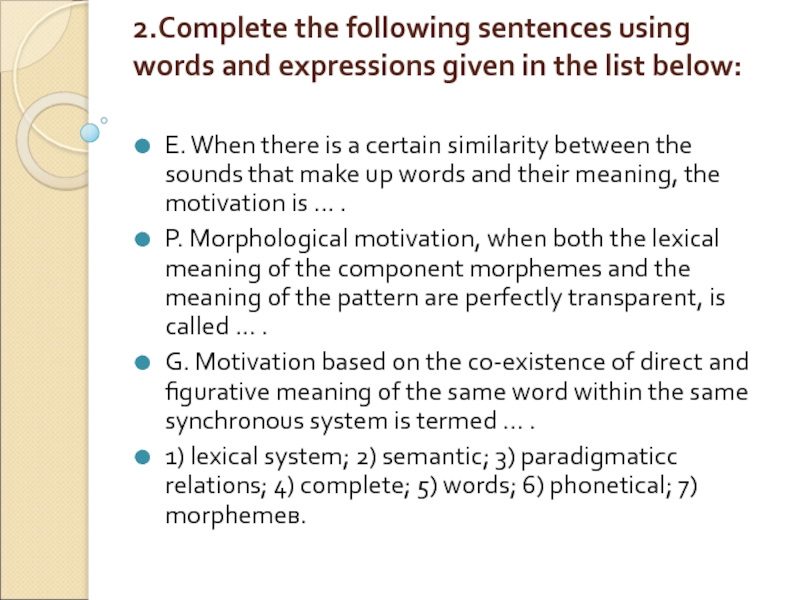
Слайд 63. Answer these questions
What determines the choice of stylistically marked words
in each particular situation?
In what situations are informal words used?
What are the main kinds of informal words? Give a brief description of each group.
What is the difference between colloquialisms and slang? What are their common features? Illustrate your answer with examples.
What are the main features of dialect words?
Where are formal words used?
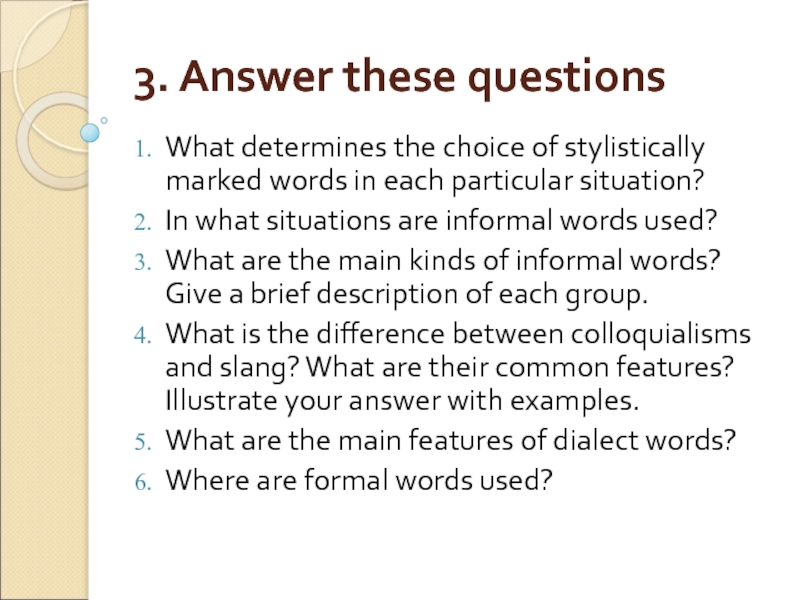
Слайд 73. Answer these questions
Are learned words used only in books? Which
type of learned words, do you think, is especially suitable for verbal communication? Which is least suitable and even undesirable?
What are the principal characteristics of archaic words?
What are the controversial problems connected with professional terminology?
Do you think that students of English should learn terms? If so, for which branch or branches of knowledge?
What is understood by the basic vocabulary?
Which classes of stylistically marked words should be included in the students’ functional vocabulary?
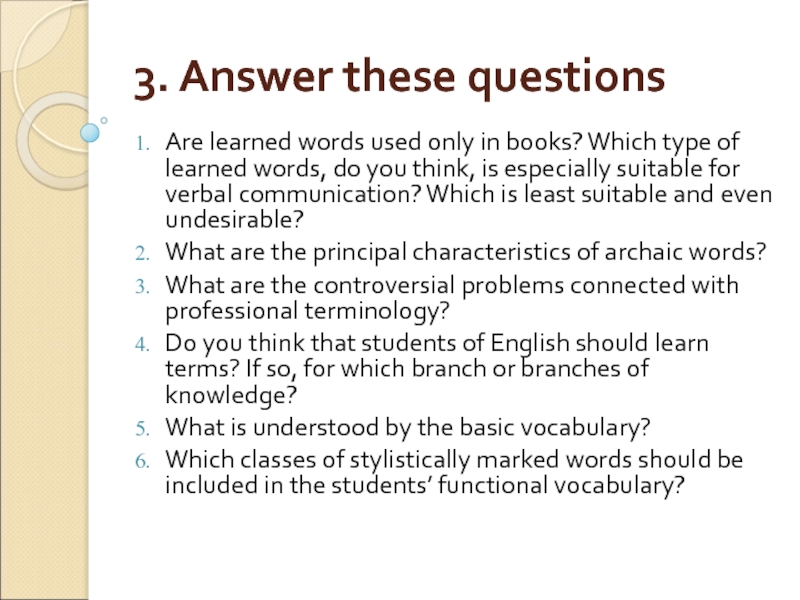
Слайд 81.A word as a fundamental unit of language.
The term system (definition)
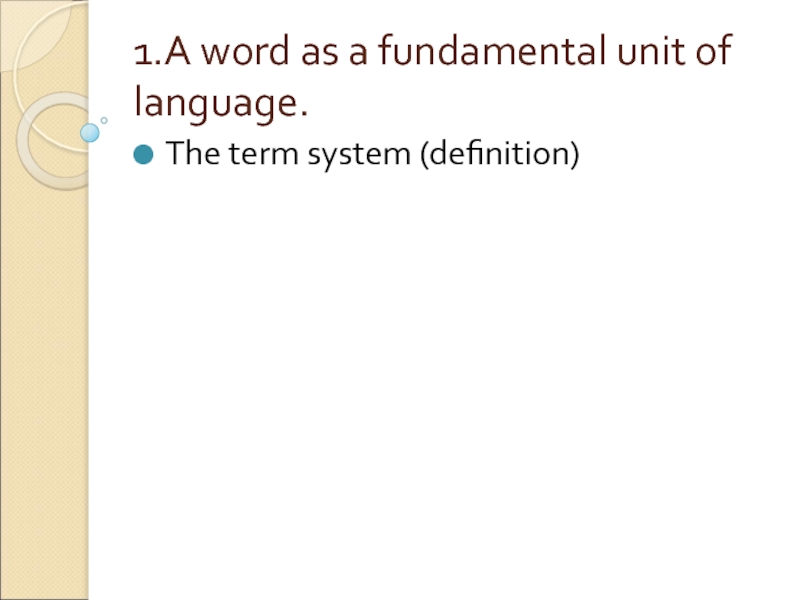
Слайд 9The term system
denotes a set of elements associated and functioning together
according to certain laws.
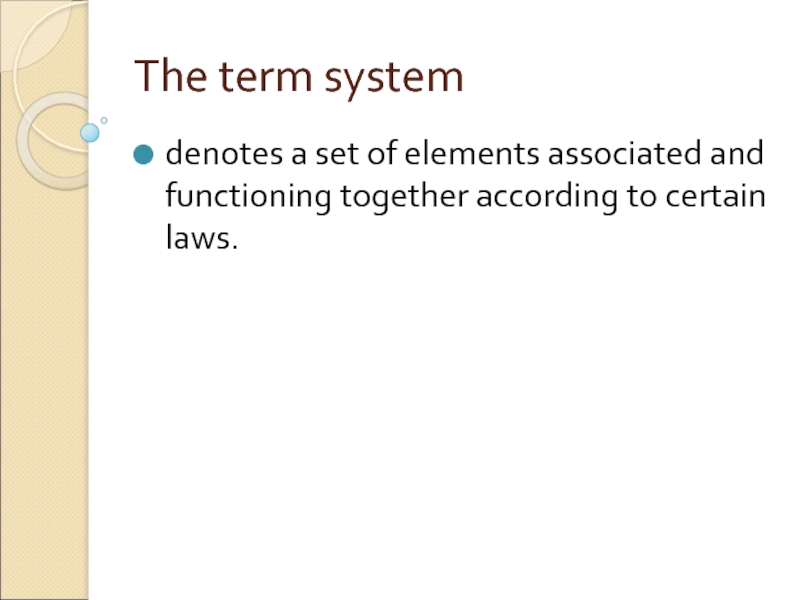
Слайд 10The lexical system of every epoch
contains
productive elements typical of
this particular period
others that are archaic and are dropping out of usage
some new phenomena, neologisms
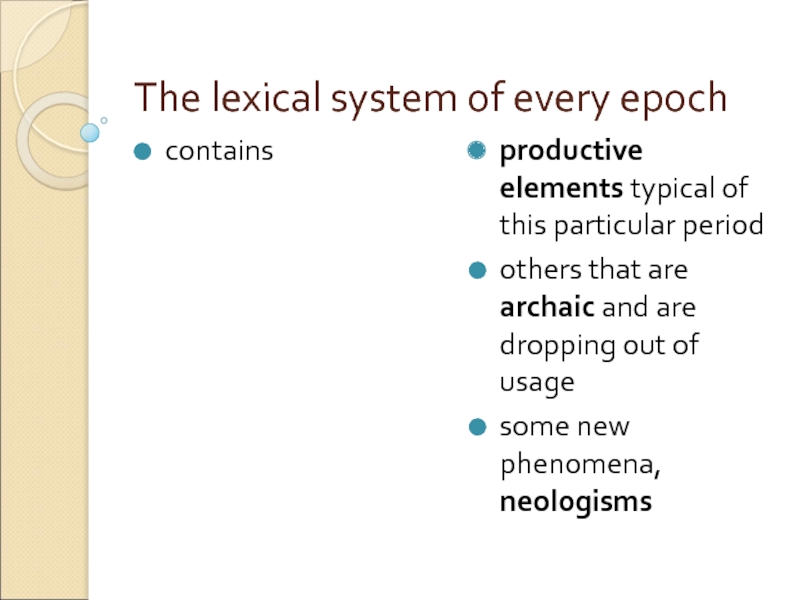
Слайд 11The elements of lexical system
are characterized
by their combinatorial and contrastive properties
determining their syntagmatic and paradigmatic relationships.
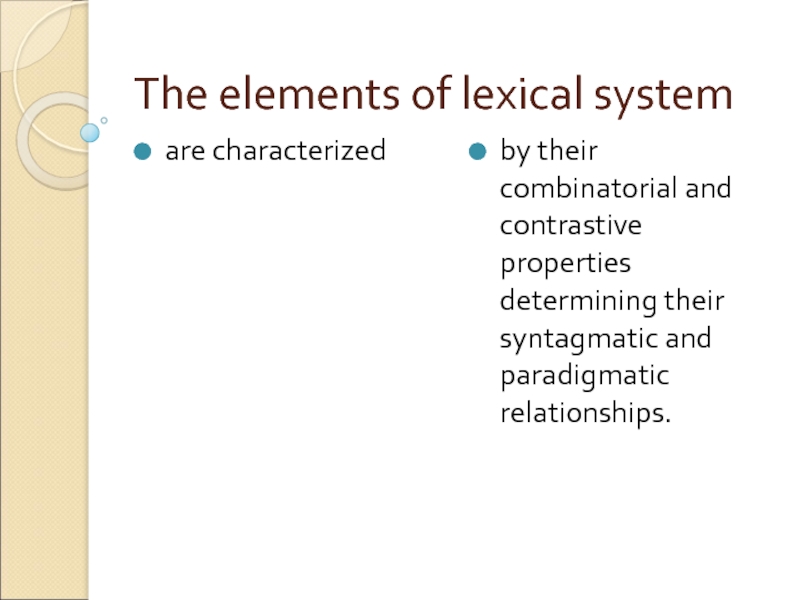
Слайд 12EXAMPLE
compare the meaning of the verb «to get» in the sentences
He got a letter.
He got tired
He got to London.
He could not get the piano through the door.
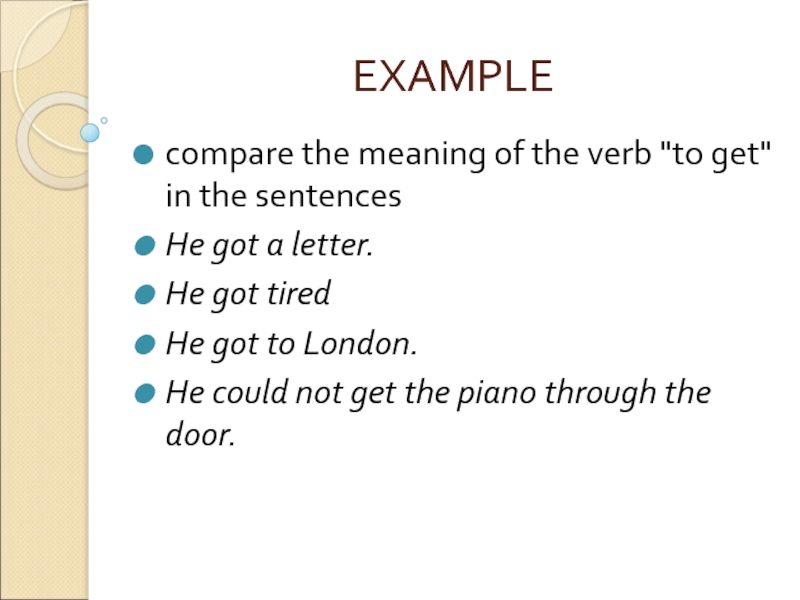
Слайд 13On the syntagmatic level,
the semantic structure of the word is
analysed in its linear relationships with neighbouring words in connected speech. In other words, the semantic characteristics of the word are observed, described and studied on the basis of its typical contexts.
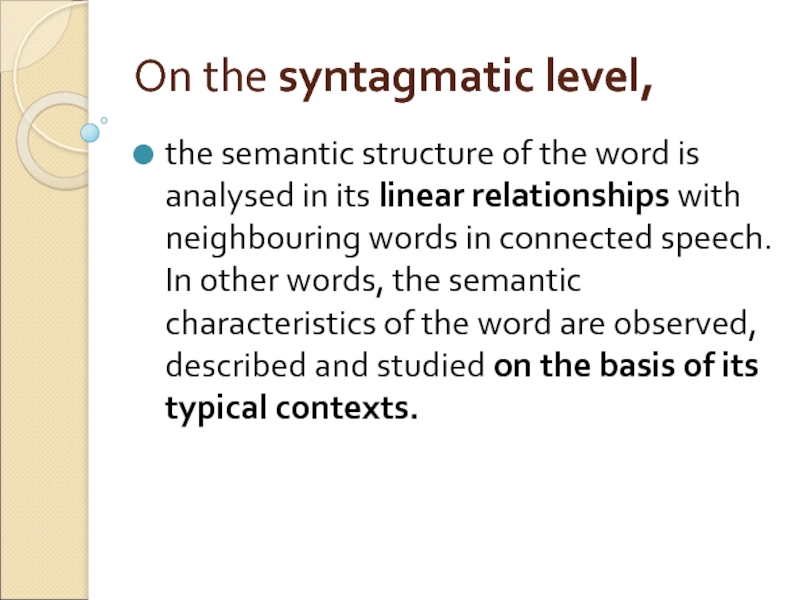
Слайд 14Paradigmatic contrastive relations
Where do they exist ?
Example:
to go a mile
to
run a mile
to walk a mile
To stroll a mile
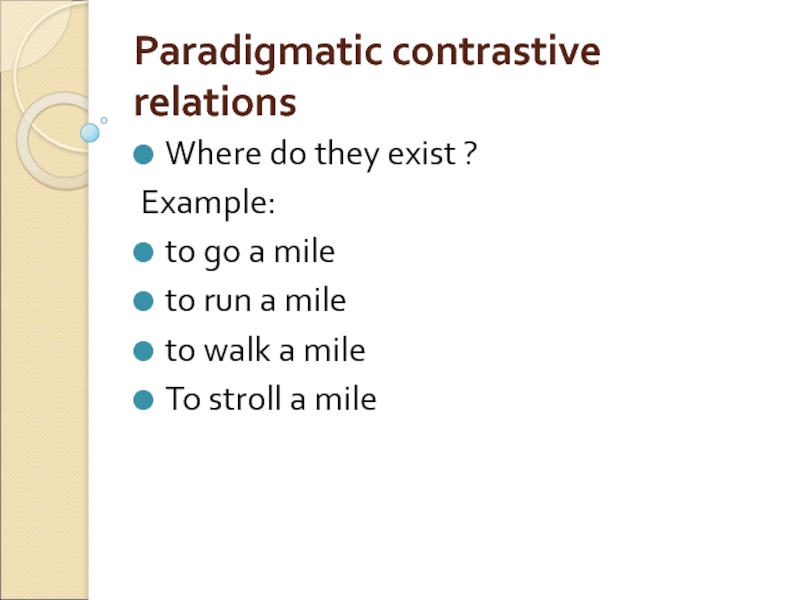
Слайд 15Paradigmatic contrastive relations
exist between words belonging to one subgroup of
vocabulary items (e.g., verbs of motion, of sense perception, sets of synonyms, etc.) that can occur in the same context and be contrasted to one another. Paradigmatic relations are observed in the system of language.
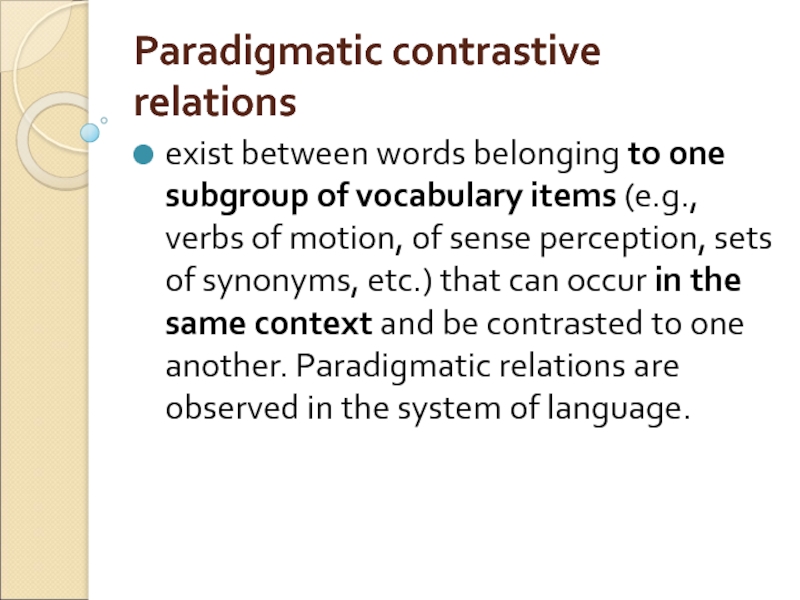
Слайд 16On the paradigmatic level
the word is studied in its relationships
with other words in the vocabulary system.
So, a word may be studied in comparison with other words of similar meaning.
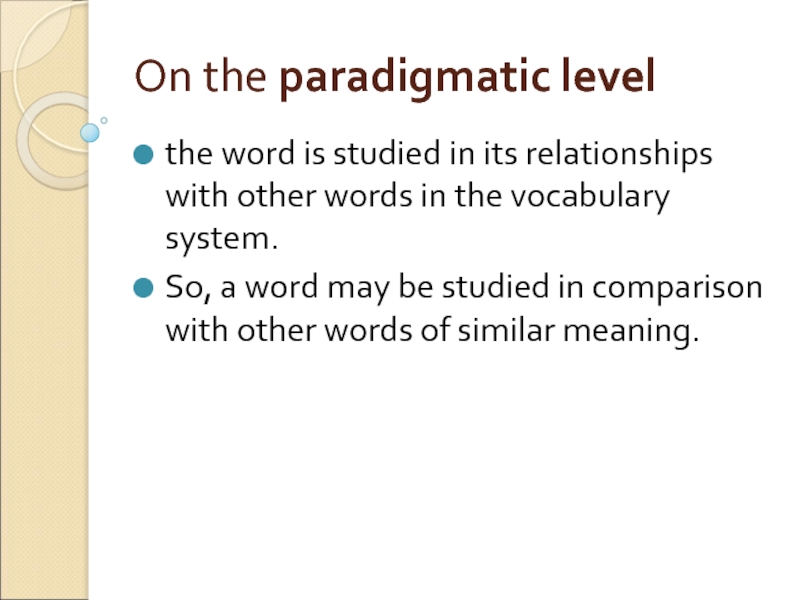
Слайд 17work n – labour n.
Work работа, труд; 1 the job
that a person does especially in order to earn money. This word has many meanings (in Oxford Dictionary – 14), many synonyms and idioms [`idiemz]: creative work творческая деятельность; public work общественные работы; his life`s work дело его жизни; dirty work (difficult, unpleasant) 1 чёрная работа; 2 грязное дело, подлость. Nice work! Отлично! Здорово! Saying (поговорка): All work and no play makes Jack a dull boy
labour – 1 work, especially physical work: manual labour, a labour camp – исправительно-трудовой лагерь; 2 people who work: a shortage of labour; cheap labour; skilled labour – квалифицированные рабочие, Labour Party; labour relations; a labour of Sisyphus; Sisyphean labour [,sisi‘fi:en] сизифов труд; тяжёлый и бесплодный труд – of a task impossible to complete
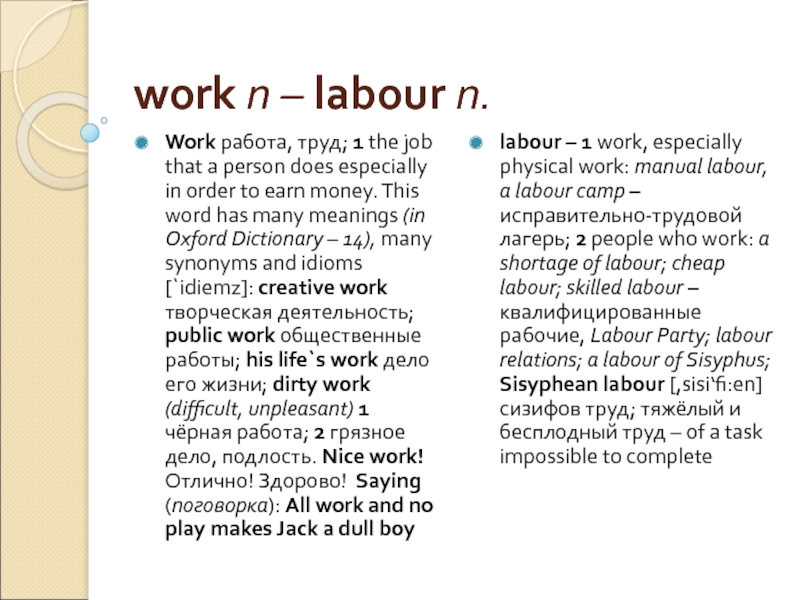
Слайд 18On the paradigmatic level
words of similar meaning
e.g. to refuse
v – to reject v
of opposite meaning (e.g. busy adj – idle adj;
to accept v – to reject v)
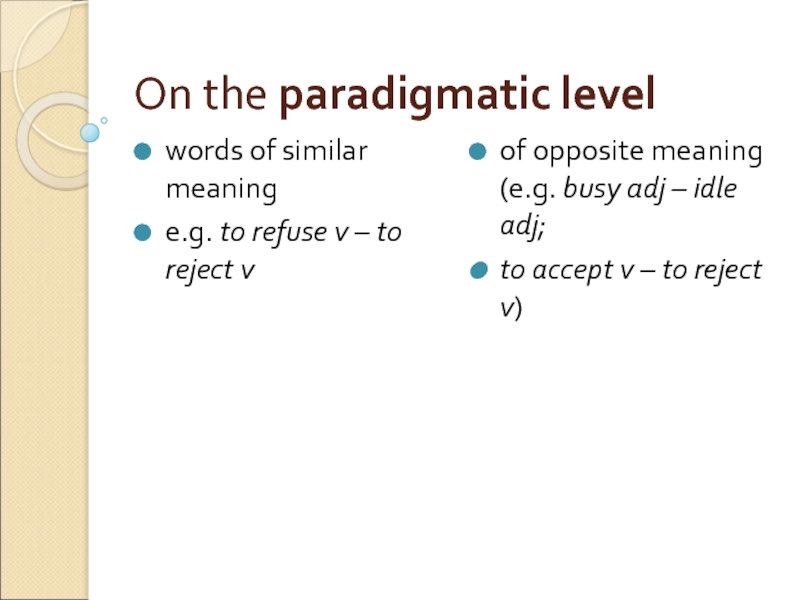
Слайд 19On the paradigmatic level
of different stylistic characteristics
(e.g. man n –
chap n – bloke n – guy n).
Man – chap (coll.) – парень, малый; a good chap – славный малый; old chap – старина; chap – BrE, informal, becoming old-fashioned – used to talk about a man in a friendly way: He isn`t such a bad chap really.
Bloke (coll.) тип, парень: He seemed like a nice bloke.
Guy – coll. US – малый; tough guy железный малый; wise guy умник; guys (informal, especially US) a group of people of either sex: Come on, you guys!
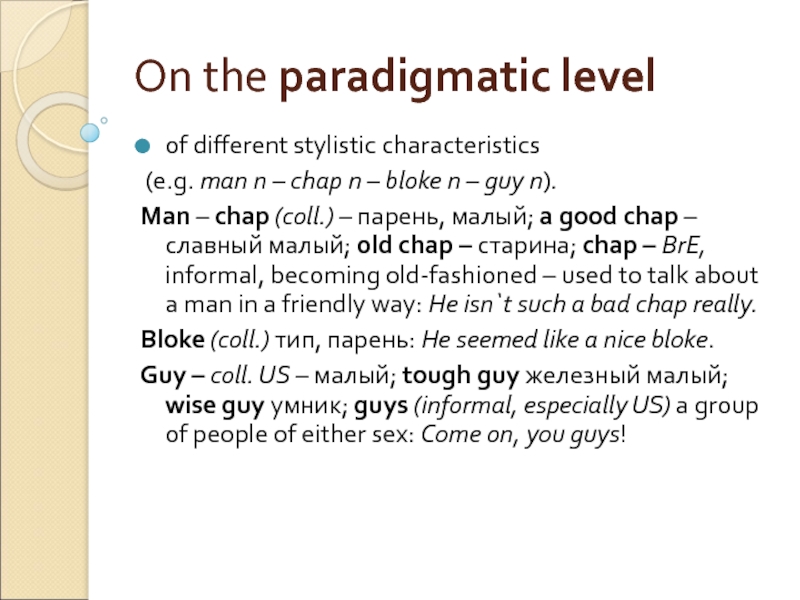
Слайд 20The main problems of paradigmatic studies
are synonymy,
antonymy,
functional styles.
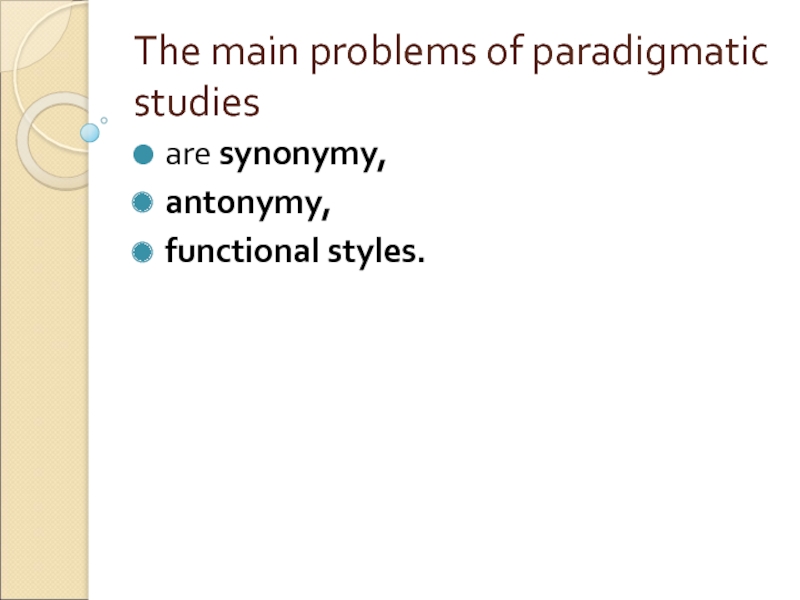
Слайд 21Words vs Morphemes
the central elements of language system
the biggest
units of morphology
the smallest units of syntax
can be separated in an utterance
can be used in isolation as a complete utterance
is composed of one or more morphemes
are also meaningful units
can not be used independently
are always parts of words
cannot be divided into smaller meaningful words
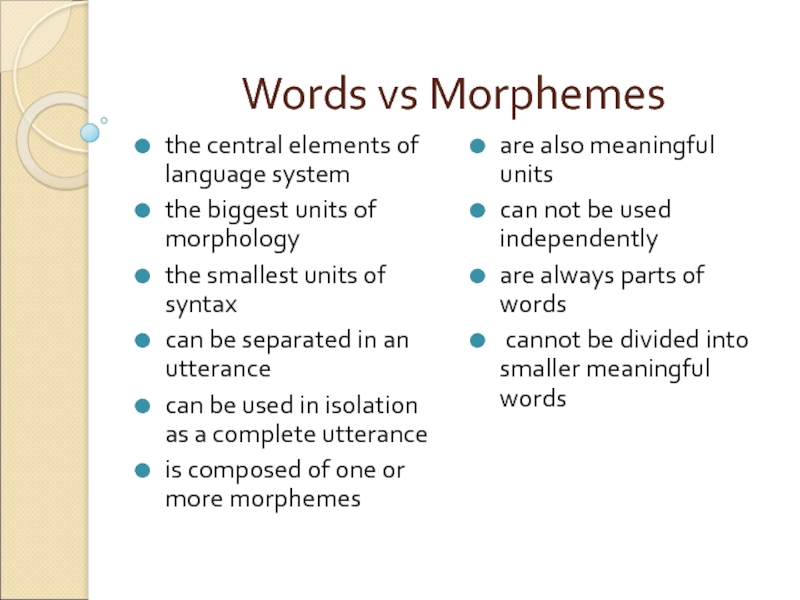
Слайд 22Why is the definition of a word
the most difficult?
The simplest word
has many different aspects:
a sound form and morphological structure;
may occur in different word-forms, different syntactic functions
signal various meanings
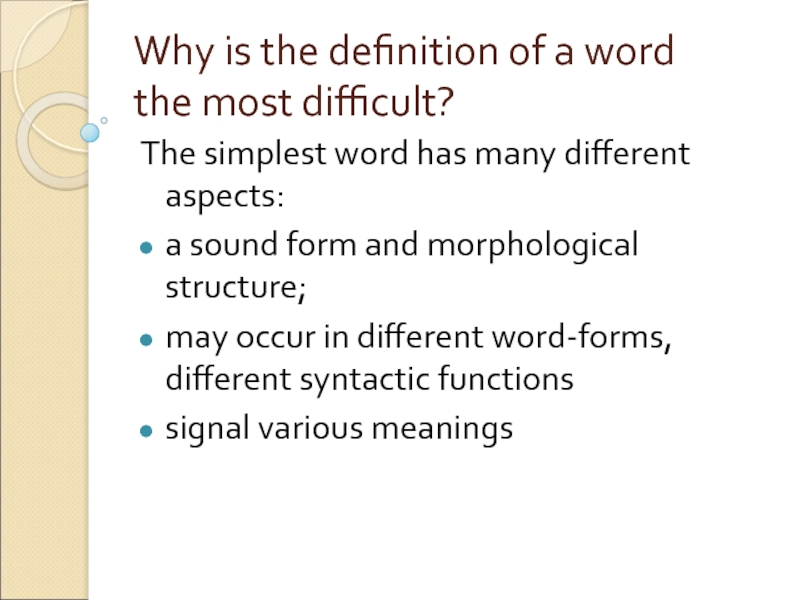
Слайд 23Why is the definition of a word
the most difficult?
the word is
a sort of focus for the problems of
phonology,
lexicology,
syntax,
morphology
sciences that have to deal with language and speech, such as philosophy and psychology
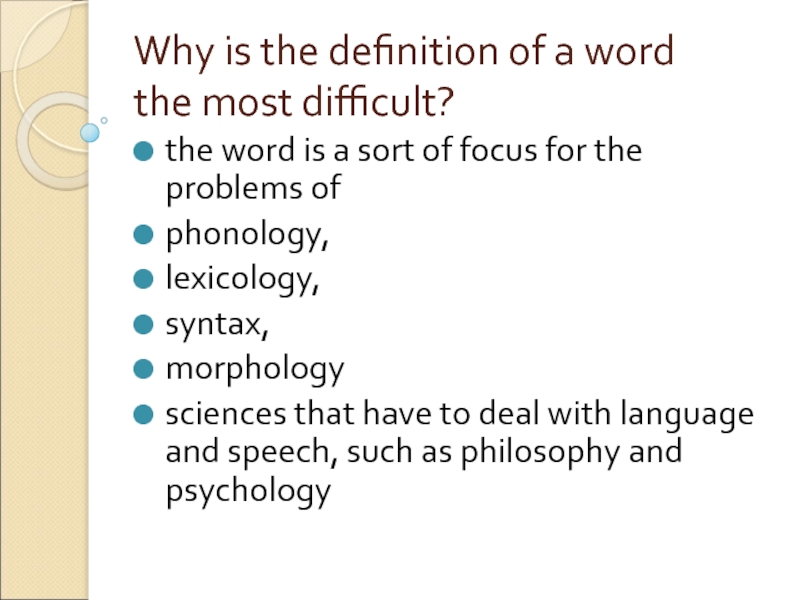
Слайд 24The definition of a word
The word has been defined semantically, syntactically,
phonologically and by combining various approaches.
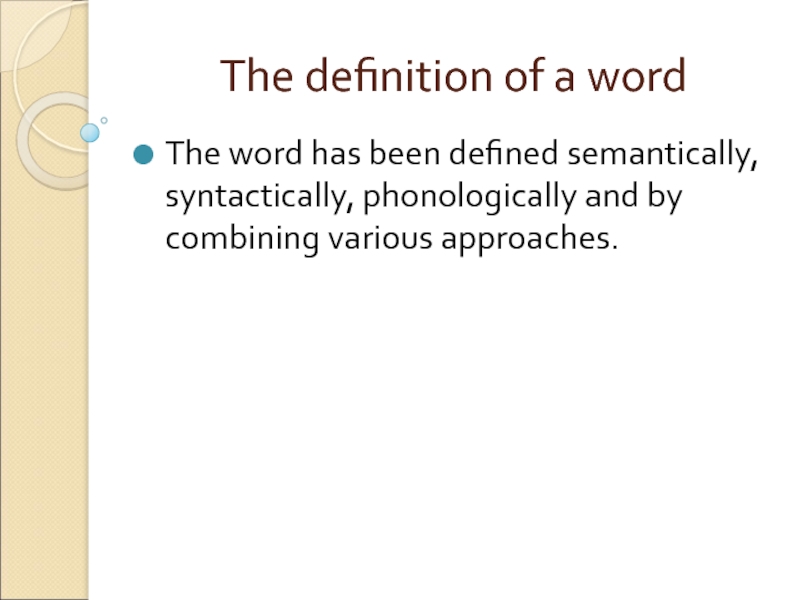
Слайд 25The definition of a word
Many eminent scholars such as V.V. Vinogradov,
A.I. Smirnitsky, O.S. Akhmanova, M.D. Stepanova, A.A. Ufimtseva contributed to creating a word theory. It is based upon the understanding of the relationship between word and thought, on the one hand, and language and society, on the other.
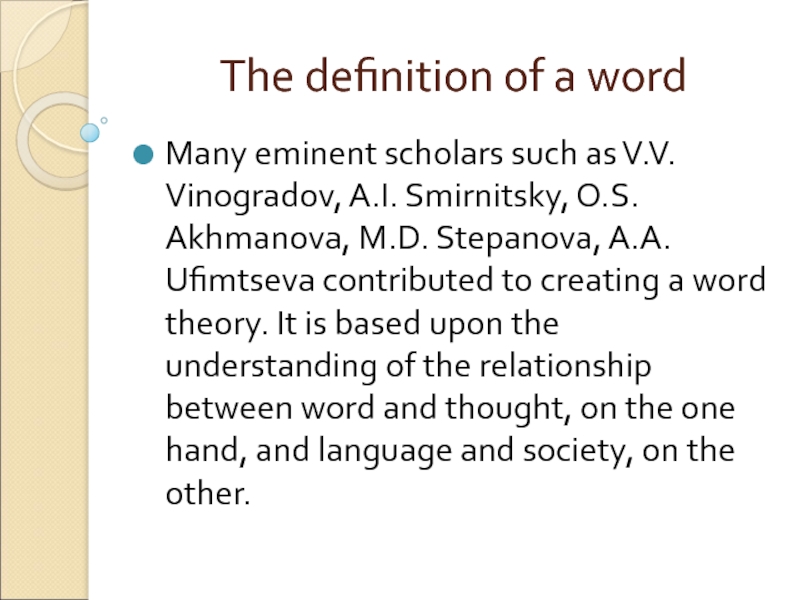
Слайд 26The definition of a word
A word is the smallest unit of
a given language capable of functioning alone and characterised by positional mobility within a sentence, morphological uninterruptability and semantic integritу.
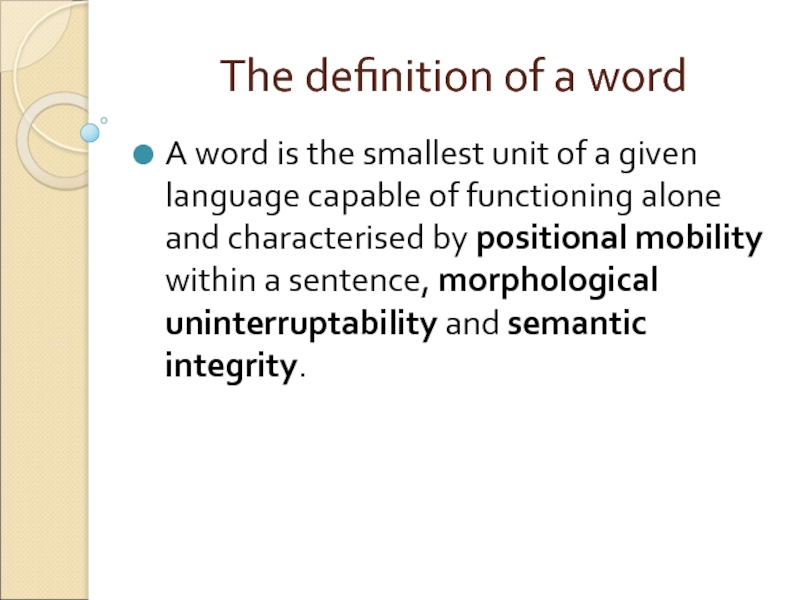
Слайд 27The definition of a word
«a word is defined by the association
of a particular meaning with a particular group of sounds capable of a particular grammatical employment.» (A. Meillet. Linguistique historique et linguistique generate. Paris, 1926. V. 1. P. 30.)
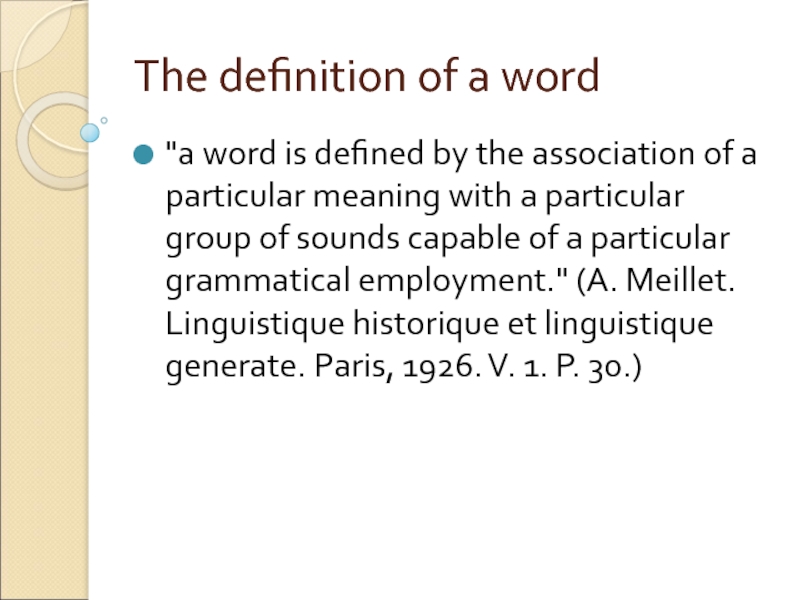
Слайд 282. Motivation of words.
The term mоtivation is used to denote the
relationship existing between the phonemic or morphemic composition and structural pattern of the word, on the one hand, and its meaning, on the other.
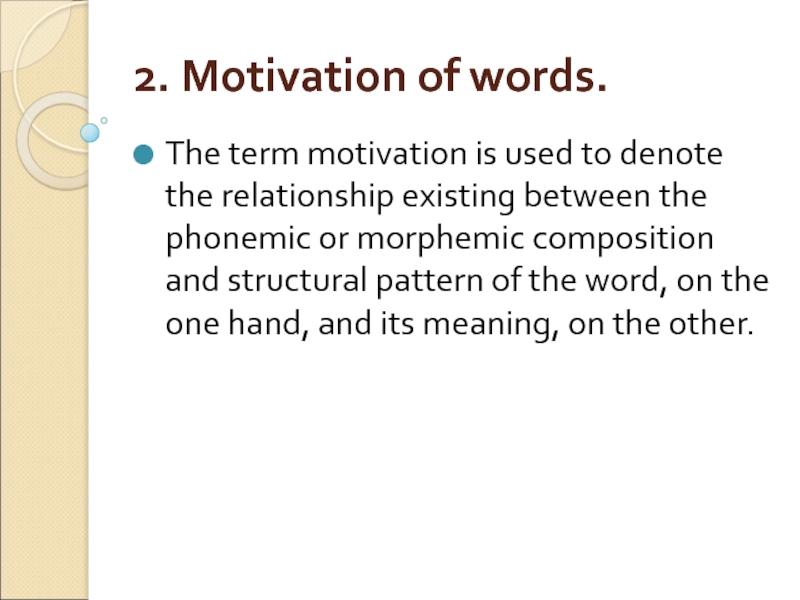
Слайд 29Three types of motivation
phonetical motivation,
morphological motivation
semantic motivation
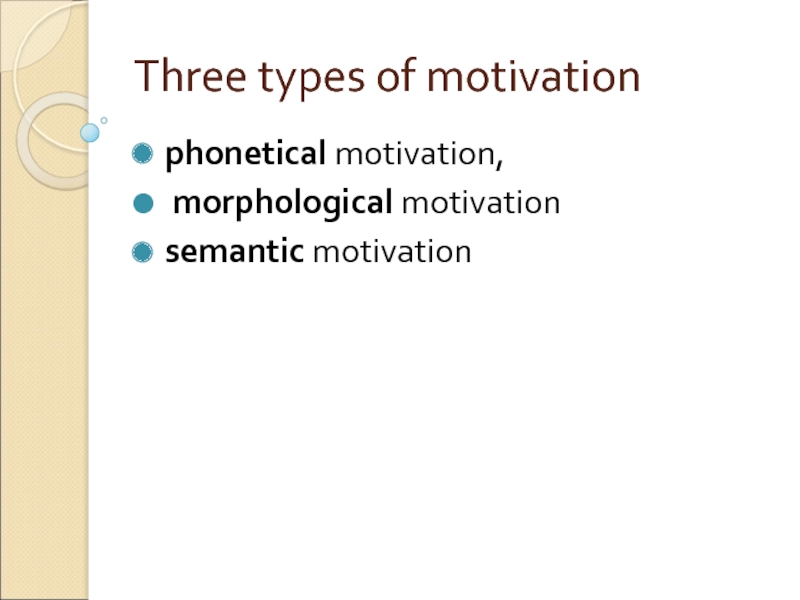
Слайд 30What motivation is it?
e.g., bump,
buzz,
chatter,
clatter,
giggle,
hiss,
whistle,
etc.
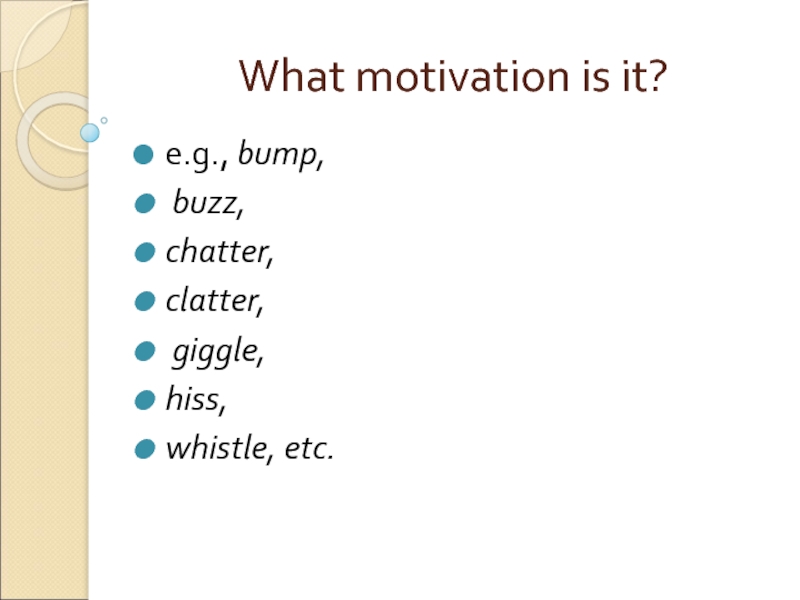
Слайд 31The phonetical motivation is
when there is a certain similarity between the
sound that make up words and their meaning.
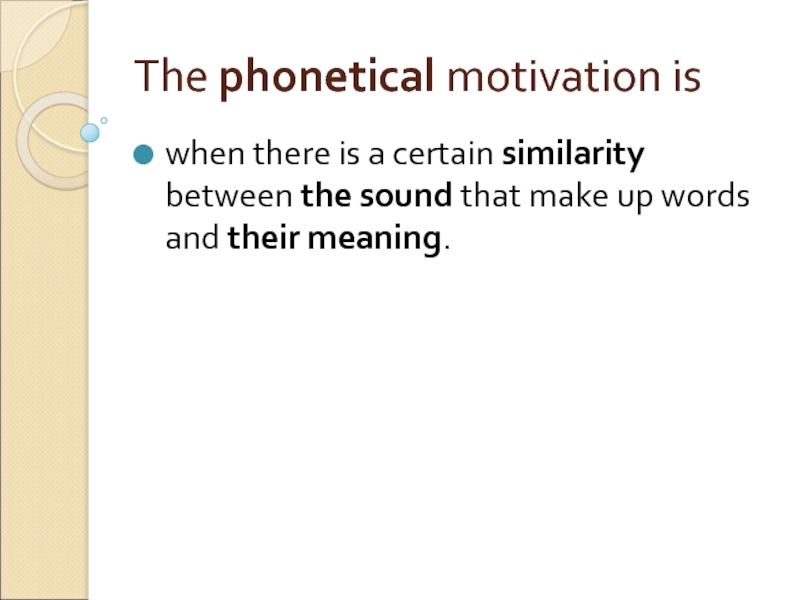
Слайд 32morphological motivation
The main criterion in morphological motivation is the relationship
between, morphemes.
e.g., «endless” is completely motivated as both the lexical meaning of the component morphemes and the meaning of the pattern are perfectly transparent.
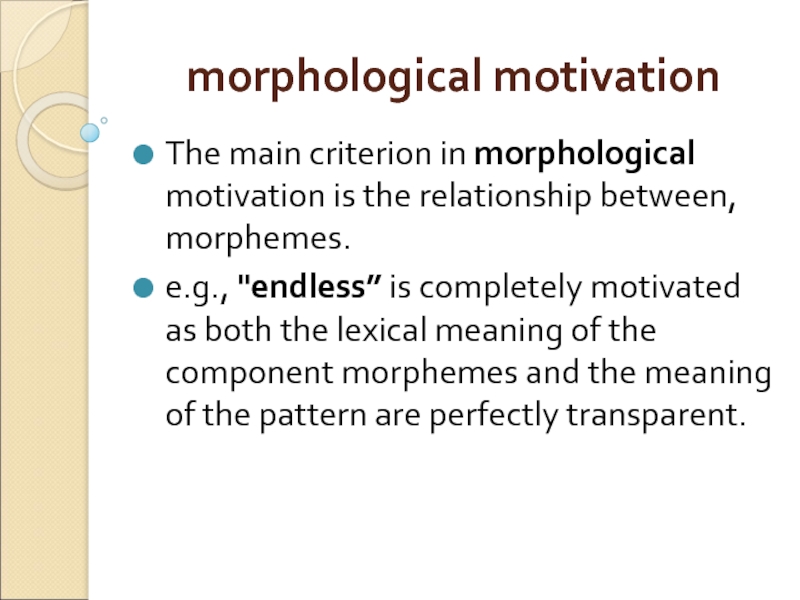
Слайд 33morphological motivation
«cranberry» is only partially motivated because of; the absence of
the lexical meaning in the morpheme «cran-«.
The words «matter», «repeat» are non-motivated because the connection between the structure of the lexical unit and its meaning is completely conventional.
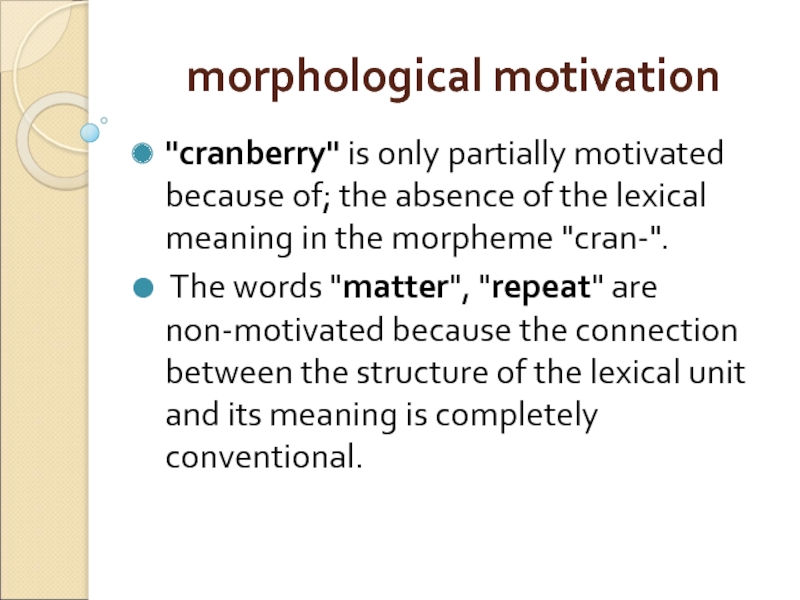
Слайд 34Semantiс motivation
is based on the co-existence of direct and figurative meaning
of the same word within the same synchronous system.
E.g., «mouth» denotes a part of a human face and can be metaphorically applied to any opening: the mouth of a river, the mouth of a furnace, mouth of pipe.
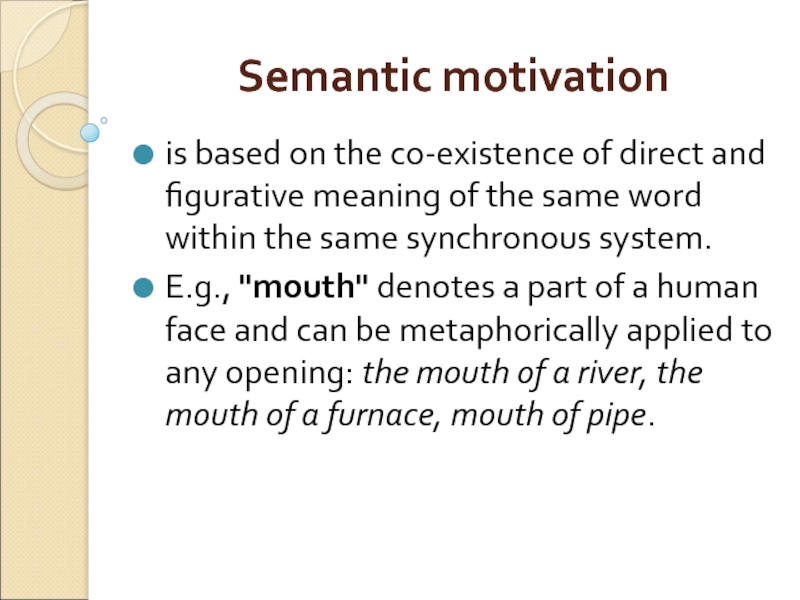
Слайд 35Semantiс motivation
Semantic motivation is clear in popular names of flowers, plants
and birds
violet,
bluebell,
bluebottle,
blackcap,
blackbird,
nightingale,
hummingbird, etc.
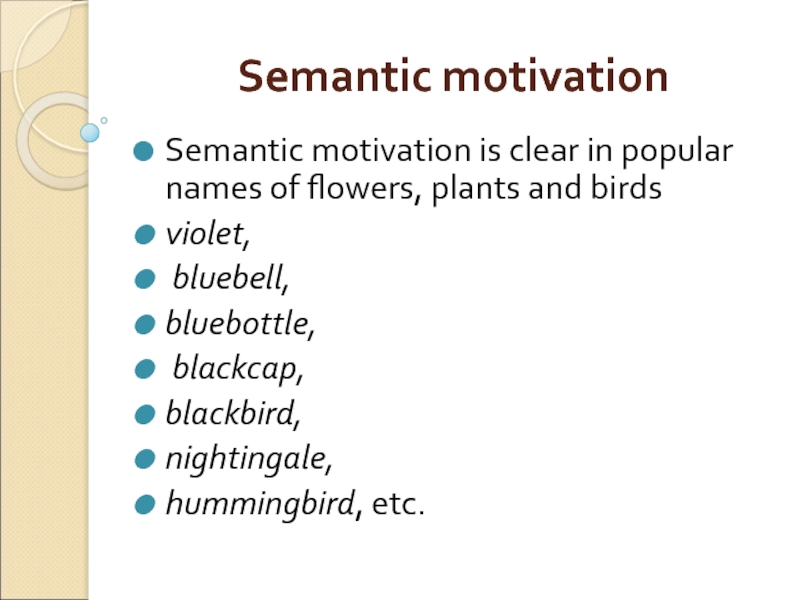
Слайд 36Semantiс motivation
As to compounds their motivation is morphological if the meaning
of the whole is based on the direct meaning of the components (e.g., headache — pain in the head), and semantic if the combination of components is used figuratively (headache — anything or anyone very annoying).
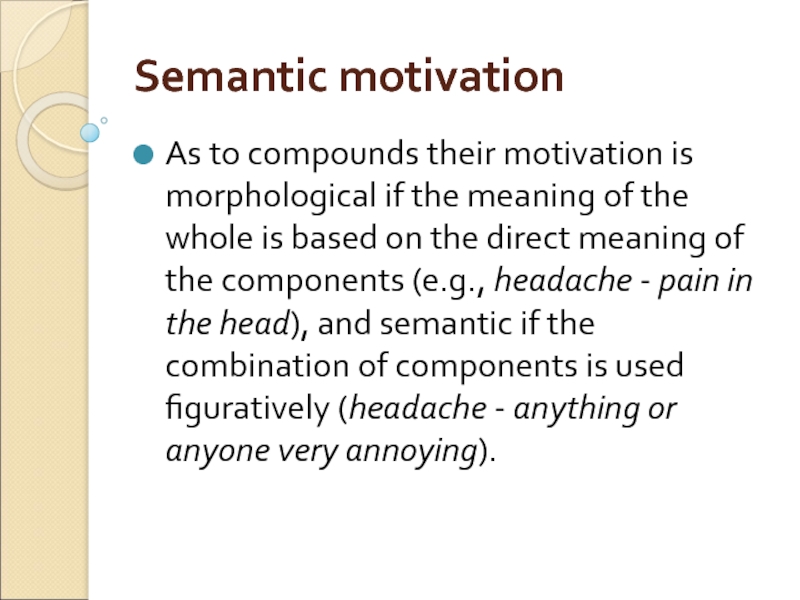
Слайд 37fоlk etуmоlogy (popular etymology, false etymology)
E.g. «mushroom” from French «moucheron»
has nothing in common with «room» (a borrowed word)
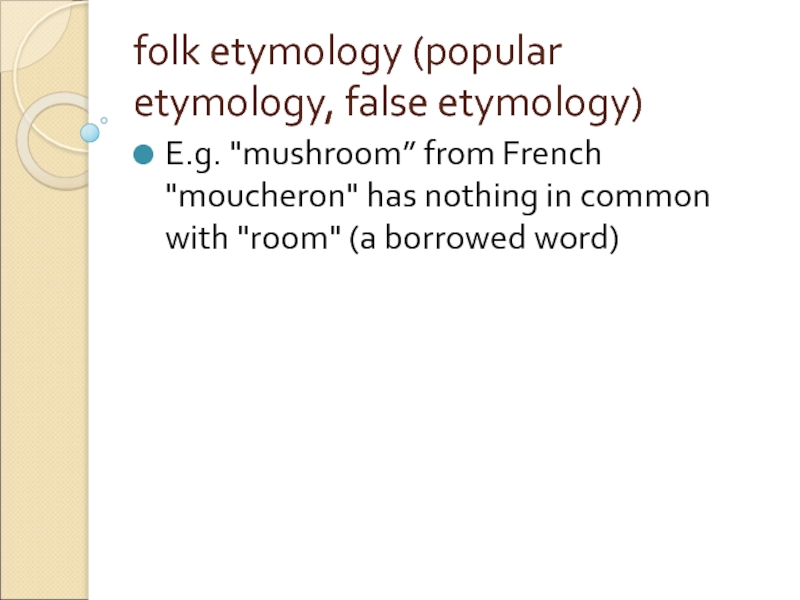
Слайд 383. Functional style (definition)
”a system of expressive means peculiar to a
specific sphere of communication”.
(I.V. Arnold )
The suitability or unsuitability of a word for each particular situation depends on its stylistic characteristics or, in other words, on the functional style it represents.
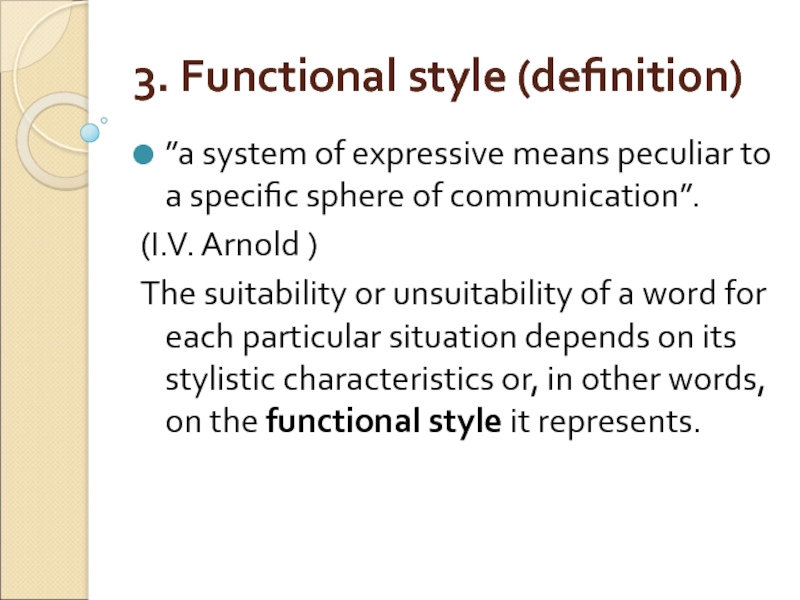
Слайд 39Functional style (definition)
A system of expressive means peculiar to a specific
sphere of communication.
By the sphere of communication scholars mean the circumstances attending the process of speech in each particular case: professional communication, a lecture, an informal talk, a formal letter, an intimate letter, a speech in court, etc.
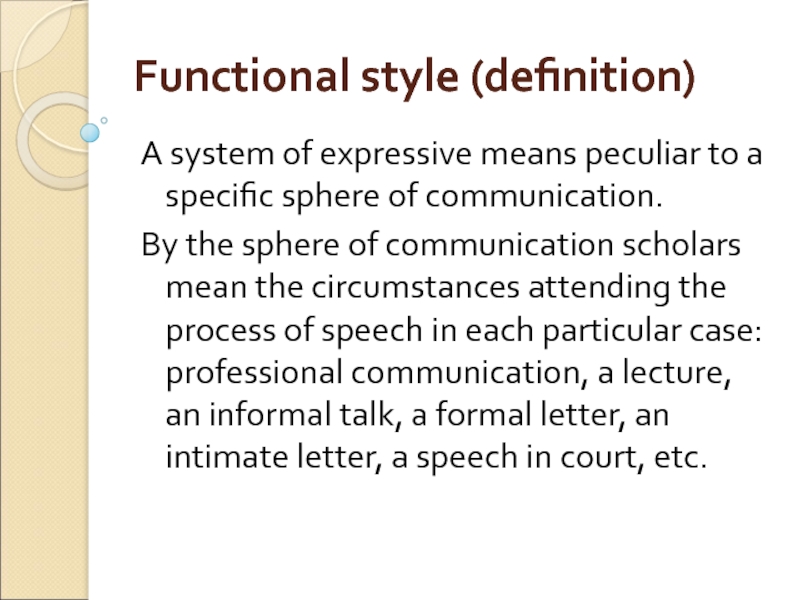
Слайд 40Subdivisions of spheres of communications
formal (a lecture, a speech in court,
an official letter, professional communication)
informal (an informal talk, an intimate letter).
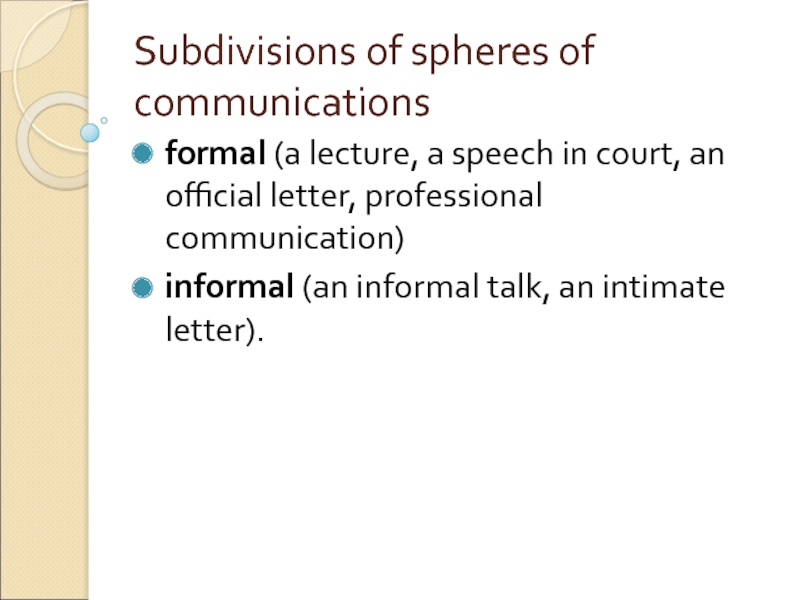
Слайд 414. Informal style (where?)
Informal vocabulary is used in one’s immediate circle:
family, relatives, or friends. One uses informal words when at home or feeling at home.
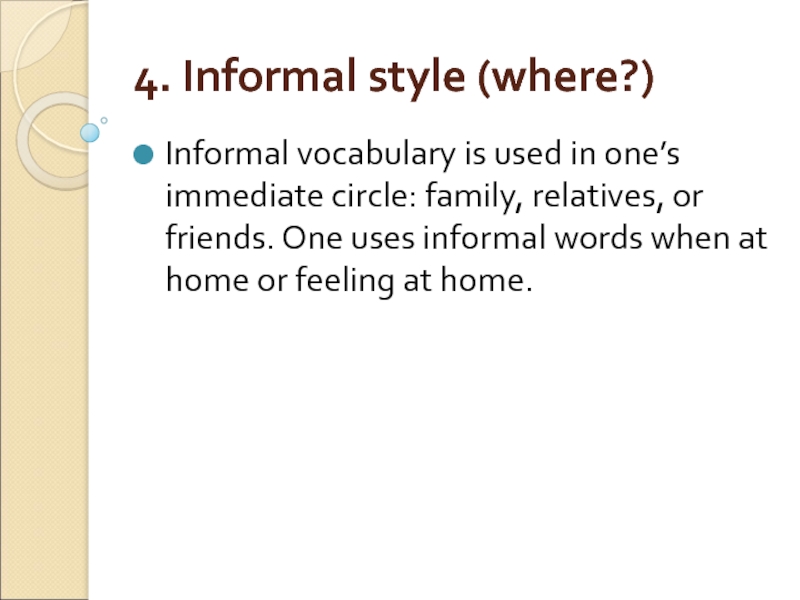
Слайд 42Informal style (characteristics)
relaxed,
free-and-easy
familiar
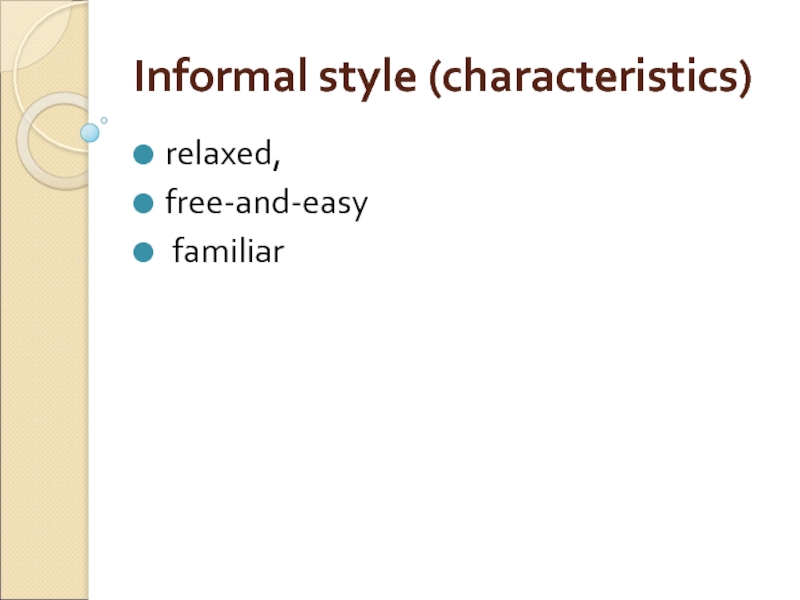
Слайд 43the informal talk differs
well-educated people
adults (the choice of words)
people living
in cities
the illiterate or the semi-educated
teenagers
people living in the provinces
(regional words and expressions)
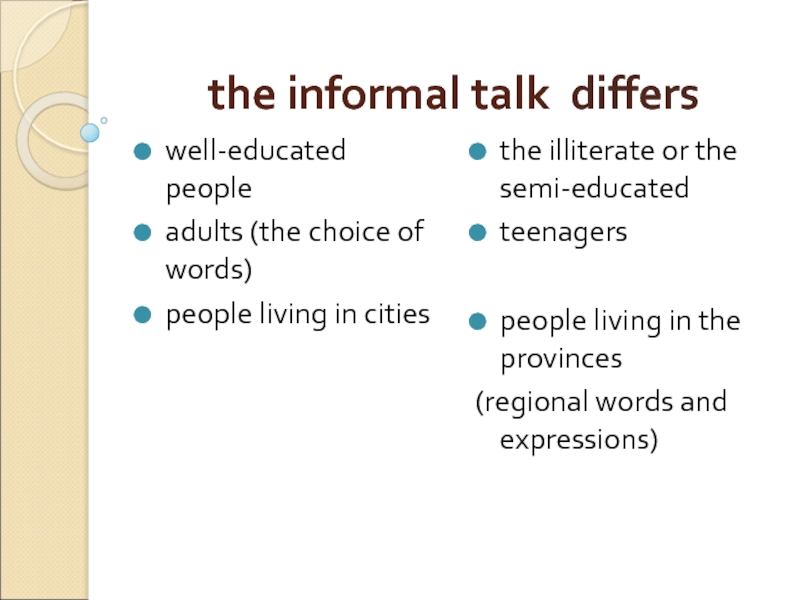
Слайд 44The choice of words
is determined not only by informal and
formal situations
but by
speaker’s educational background
speaker’s cultural background
age group
occupational and regional characteristics
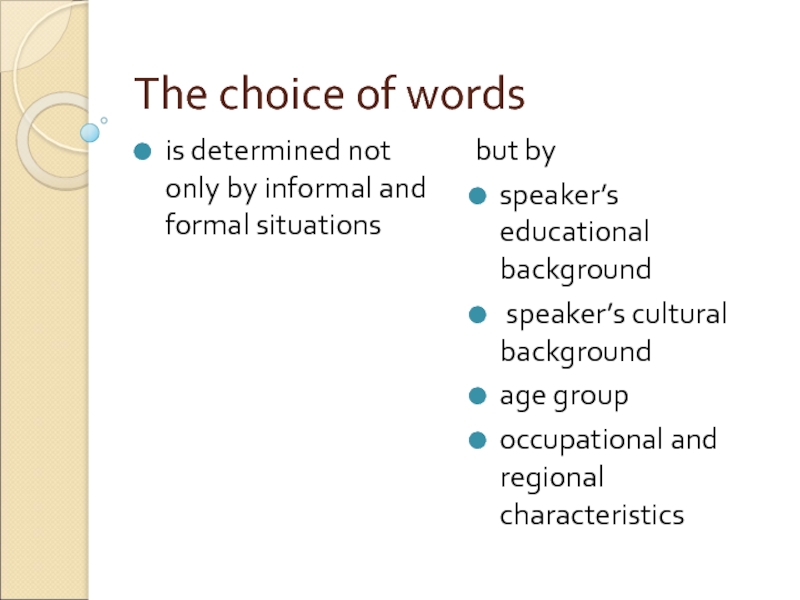
Слайд 45three types of informal words
colloquial
slang
dialect words and word-groups
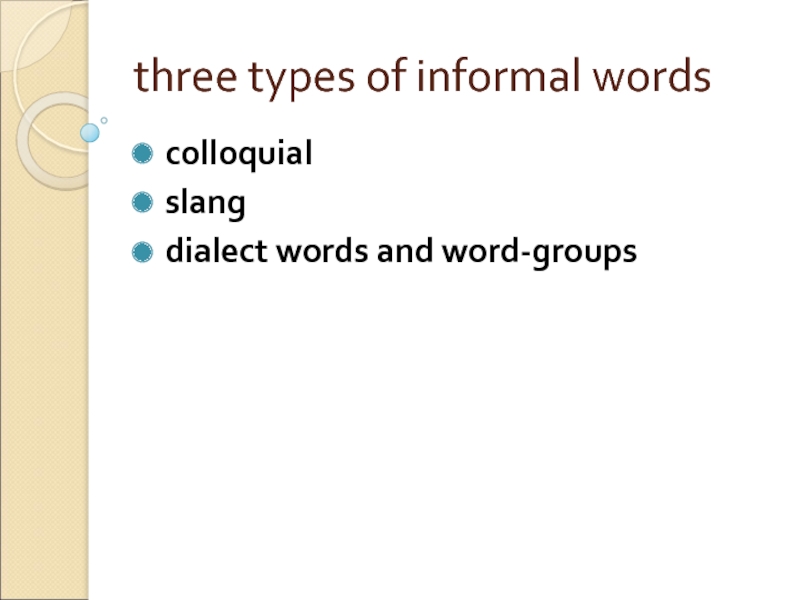
Слайд 465. Colloquial words
(Where? By whom?)
in everyday conversational speech both by cultivated
and uneducated people of all age groups.
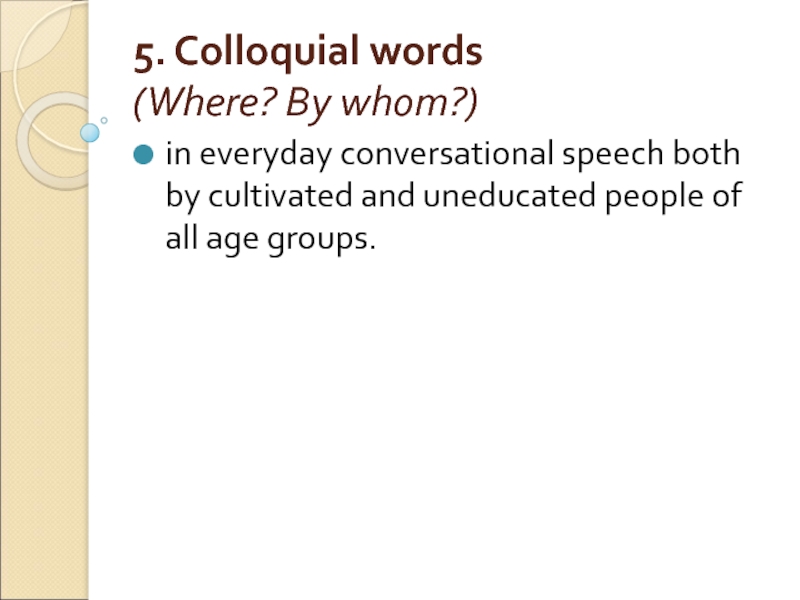
Слайд 47literary colloquial words
appear in dialogues in which they realistically reflect
the speech of modern people
appear in descriptive passages as well
(in modern fiction)
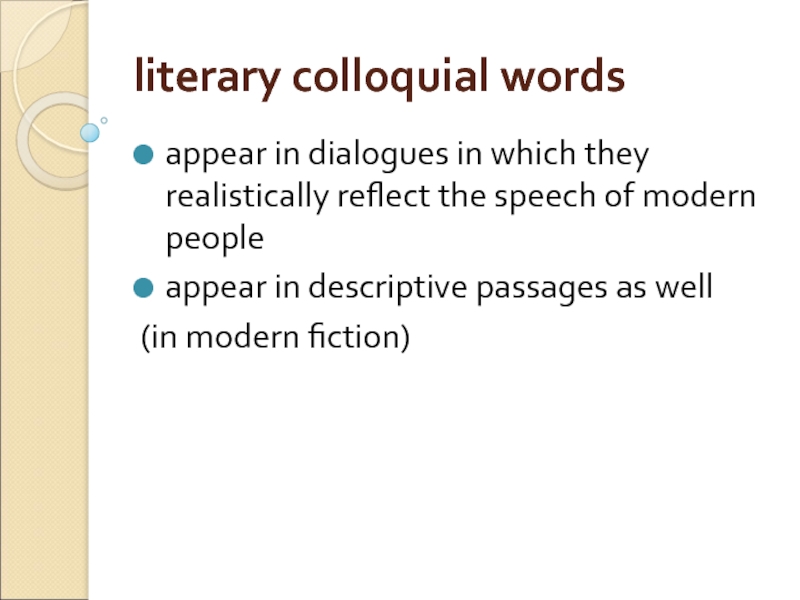
Слайд 48examples of literary colloquial words
Pal (кореш, друг) and chum (приятель,
дружок) are colloquial equivalents of friend; girl, when used colloquially, denotes a woman of any age;
bite and snack (quick meal – перекусить) stand for meal;
hi, hello are informal greetings, and so long a form of parting;
start, go on, finish and be through (покончить)
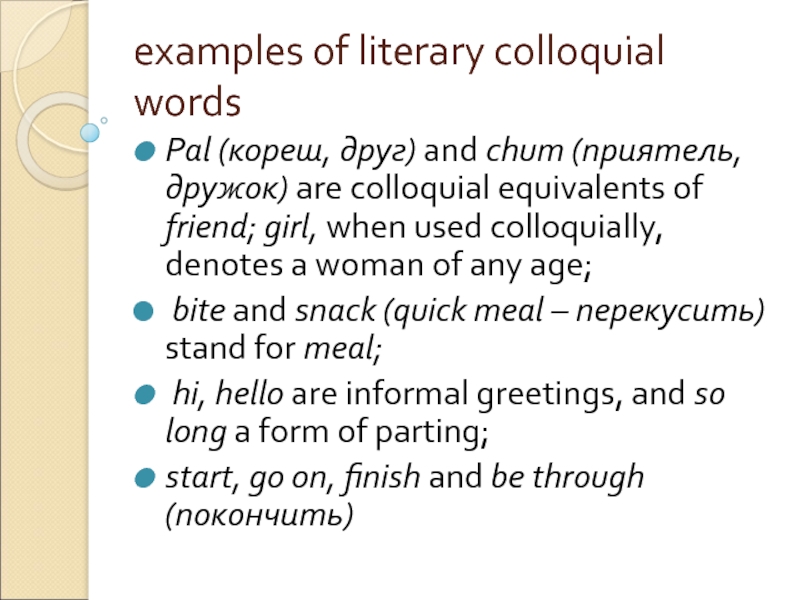
Слайд 49examples of literary colloquial words
A considerable number of shortenings are found
among words of this type.
E.g. pram, exam, fridge, flu, zip, movie.
Verbs with post-positional adverbs are also numerous among colloquialisms:
E.g. put up, put over, make up, make out, turn up,
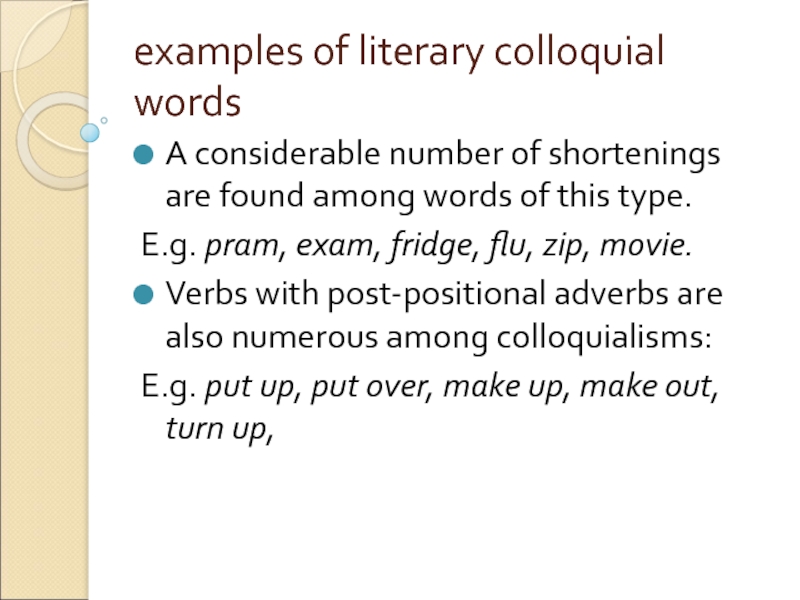
Слайд 50literary colloquial words (are to be distinguished from)
familiar colloquial words (by
the young and the semi-educated )E.g. doc (for doctor), ta-ta (for good-bye), to kid smb.(for tease, banter – подшутить), to pick up smb. (for make a quick and easy acquaintance), shut up (for keep silent).
Low colloquial (просторечие) (uncultivated people).
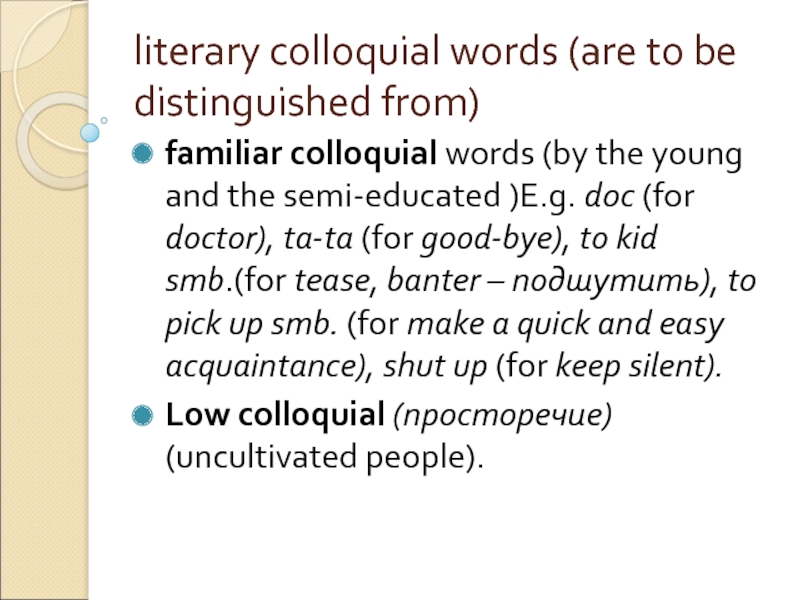
Слайд 516.Slang
The Oxford English Dictionary defines slang as “language of a highly
colloquial style, considered as below the level of standard educated speech, and consisting either of new words or of current words employed in some special sense.”
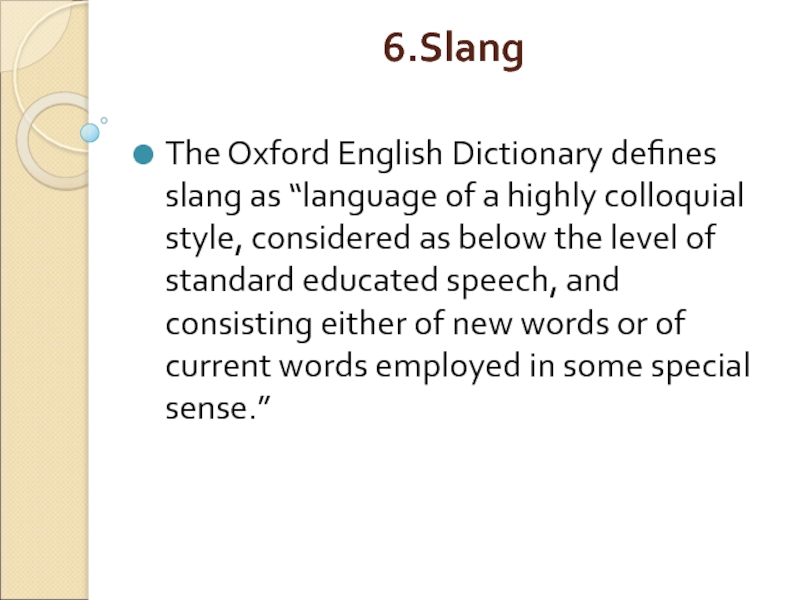
Слайд 52Slang
All or most slang words are current words whose meanings have
been metaphorically shifted. Each slang metaphor is rooted in a joke, but not in a kind or amusing joke. This is the criterion for distinguishing slang from colloquialisms: most slang words are metaphors and jocular, often with a coarse, mocking, cynical colouring.
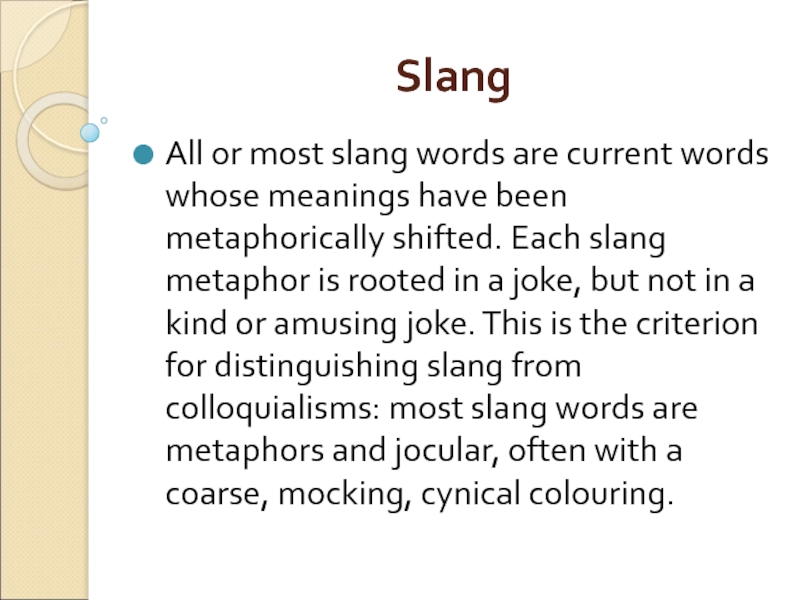
Слайд 53Slang (the main reasons to use?)
To be picturesque,
To be arresting,
To be striking
To be different from others.
To demonstrate one’s spiritual independence and daring.
To sound “modern” and “up-to-date”.
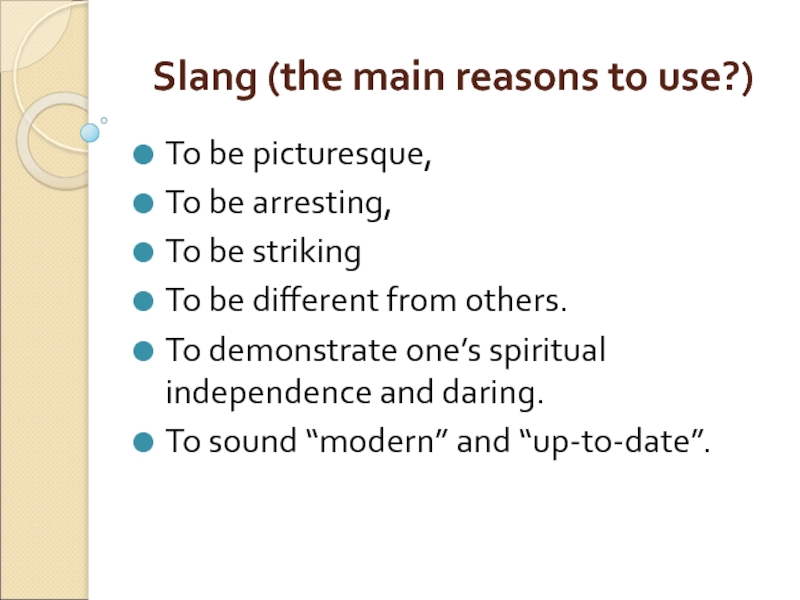
Слайд 54Slang (who are users?)
The circle of users of slang is
more narrow than that of colloquialisms.
It is mainly used by the young and uneducated.
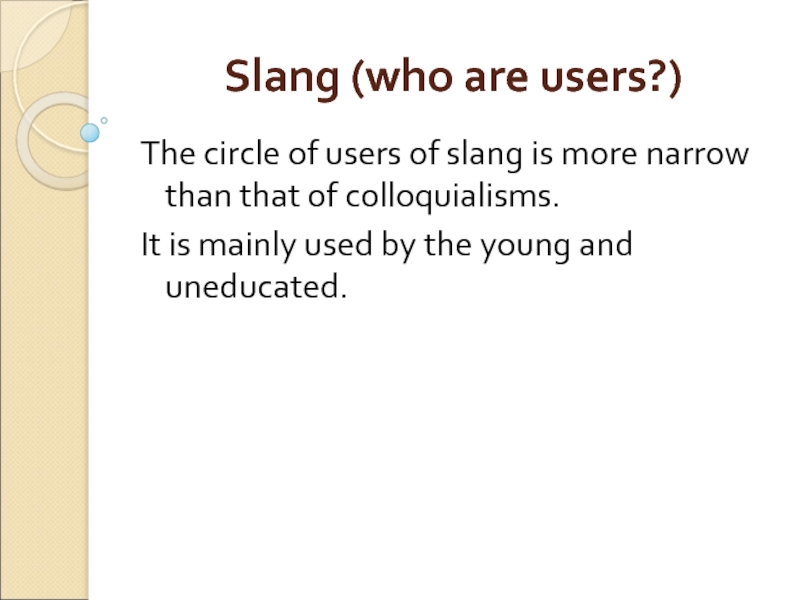
Слайд 557.Dialect words
dialects are regional forms of English
Dialect is a variety
of a language which prevails in a district, with local peculiarities of vocabulary, pronunciation and phrase.
(e.g. the Lancashire, Dorsetshire, Norfolk dialects).
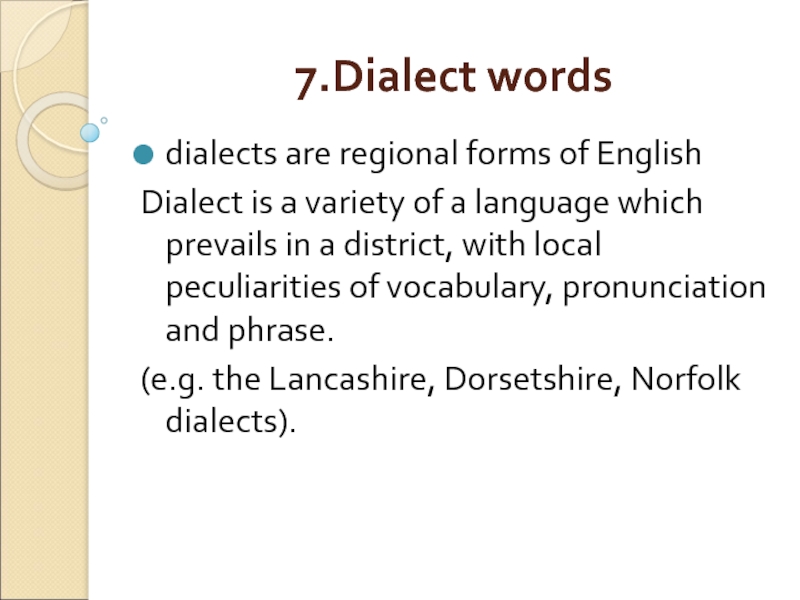
Слайд 56Dialect words are constantly being incorporated into
everyday colloquial speech or slang
into the common stock (words which are not stylistically marked)
a few of them even into formal speech
into the literary language
e.g.Car, trolley, tram began as dialect words.
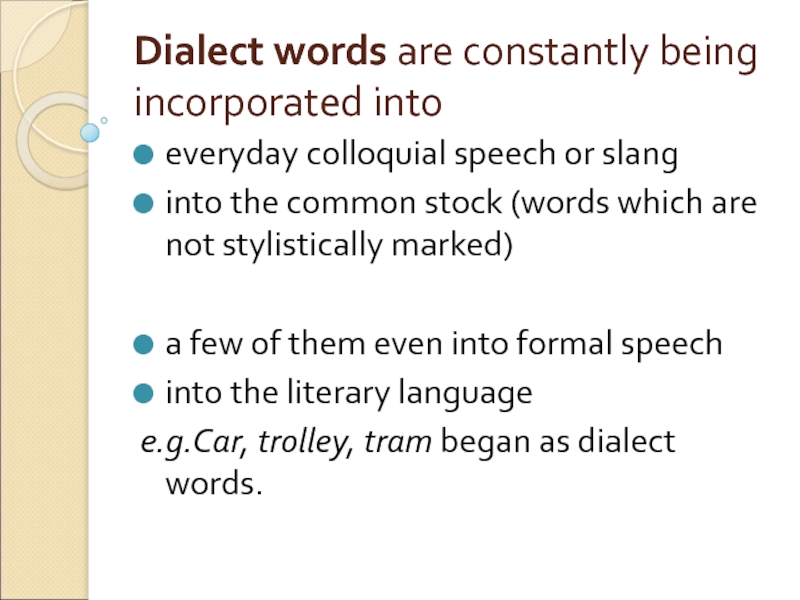
Слайд 57Dialect words (examples)
tha (thee) – the objective case of thou; brass
– money;
nivver – never;
nowt – nothing.
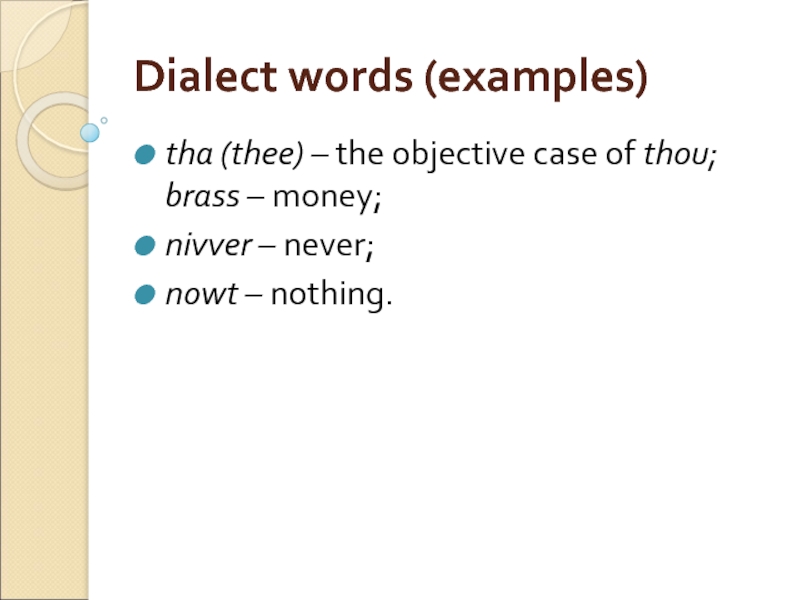
Слайд 588. Learned words (two main groups):
words associated with professional communication
associated
with the printed page. It is in this vocabulary stratum that poetry and fiction find their main resources.
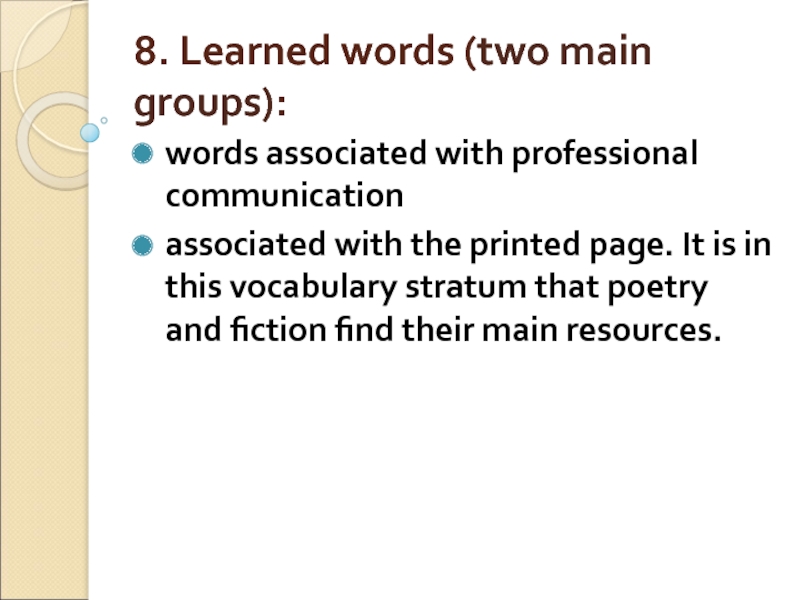
Слайд 59Learned words (further subdivision)
We find here numerous words that are used
in scientific prose and can be identified by their dry, matter-of-fact flavour (e.g. comprise, experimental, heterogeneous, homogeneous, conclusive, divergent, etc).
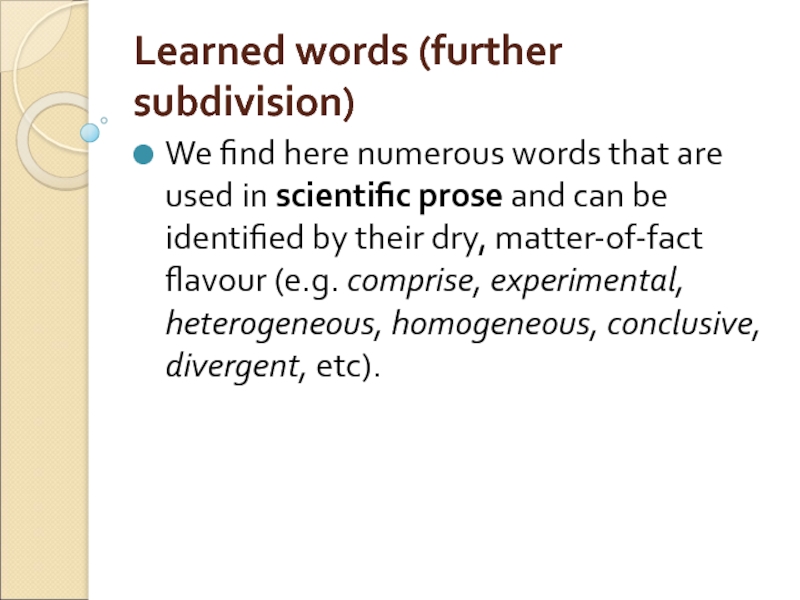
Слайд 60Learned words
‘officialese’ (канцеляризмы). These are the words of the official, bureaucratic
language. They should be avoided in speech and in print, e.g. assist (for help), endeavour (for try), proceed (for go), approximately (for about), sufficient (for enough), inquire (for ask).
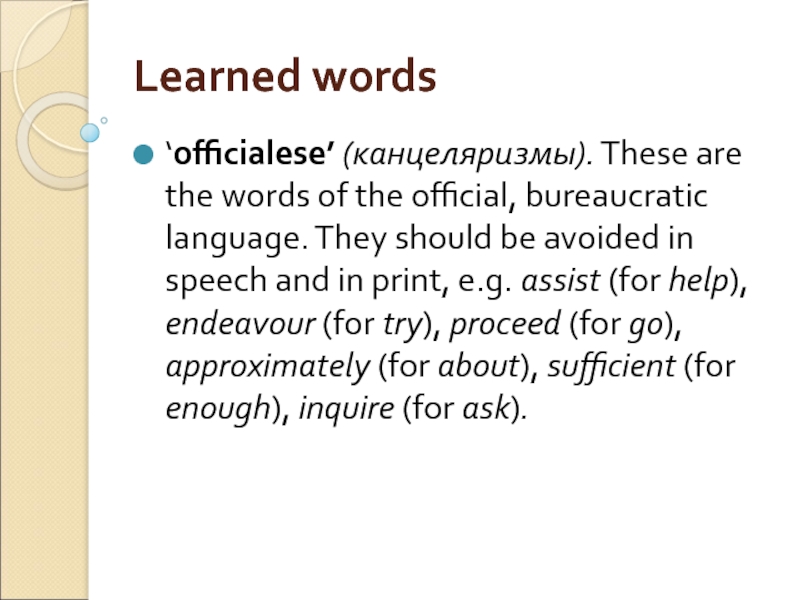
Слайд 61Learned words (further subdivision)
the words found in descriptive passages of fiction.
These words, which may be called ‘literary’, also have a particular flavour of their own, usually described as ‘refined’. They are mostly polysyllabic words drawn from the Romance language and, though fully adapted to the English phonetic system, some of them continue to sound singularly foreign.
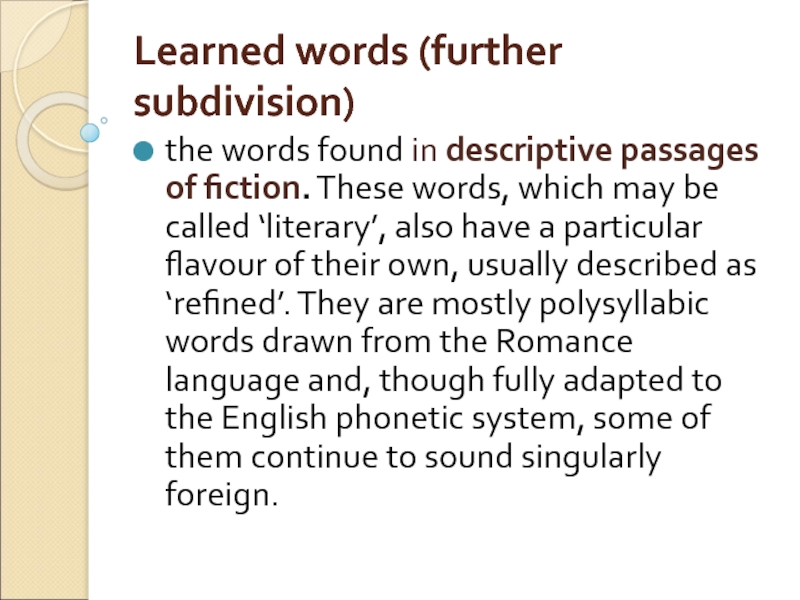
Слайд 62Learned words
Here are some examples: solitude=loneless, lonely place (уединение, одиночество), sentiment=feeling
(чувство), fascination=strong attraction (очарование, обаяние), delusion (заблуждение), meditation (размышление), cordial=friendly (сердечный, радушный).
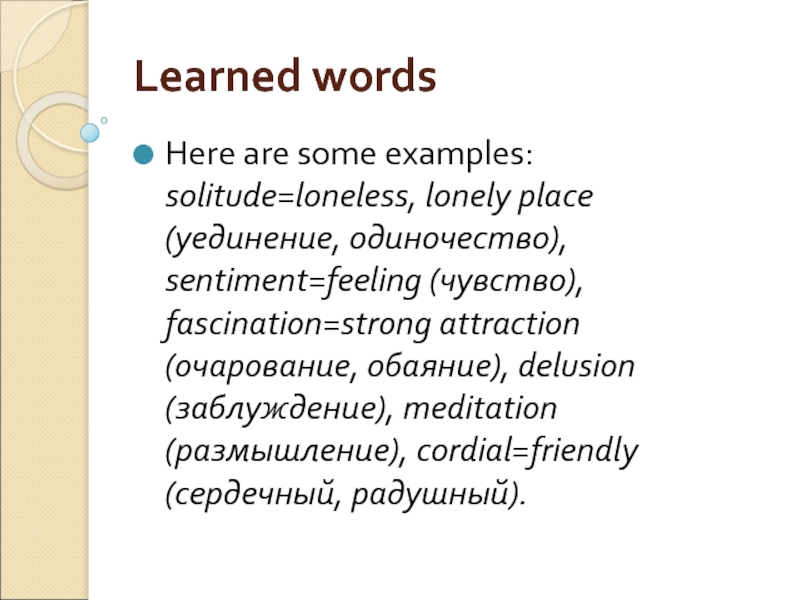
Слайд 63Learned words (further subdivision)
There is one further subdivision of learned words:
modes of poetic diction., Poetic words have a further characteristic – a lofty, sometimes archaic, colouring:
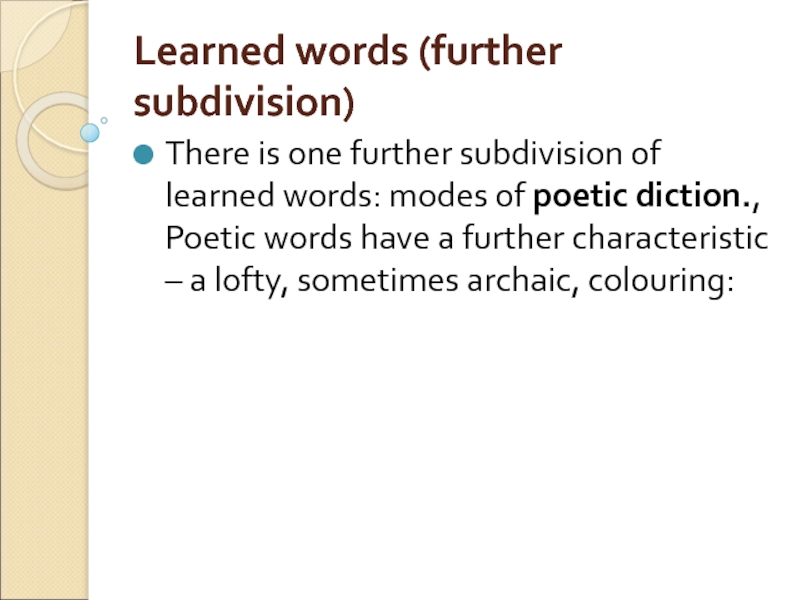
Слайд 64Examples of poetic words
“Alas! (увы) they had been friends in youth;
But
wispering tongues can poison truth
And constancy (постоянство) lives in realms (царства) above;
And life is thorny; and youth is vain…
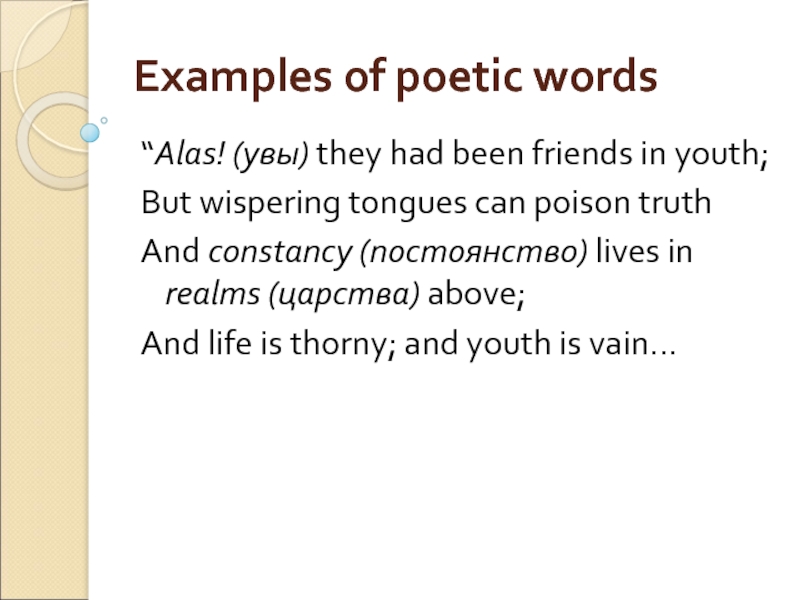
Слайд 65Learned words (not only in printed page)
Though learned words are mainly
associated with the printed page, this is not exclusively so. Any educated English-speaking individual is sure to use many learned words not only in his formal letters and professional communication but also in his everyday speech. Educated people in both modern fiction and real life use learned words quite naturally and their speech is richer for it.
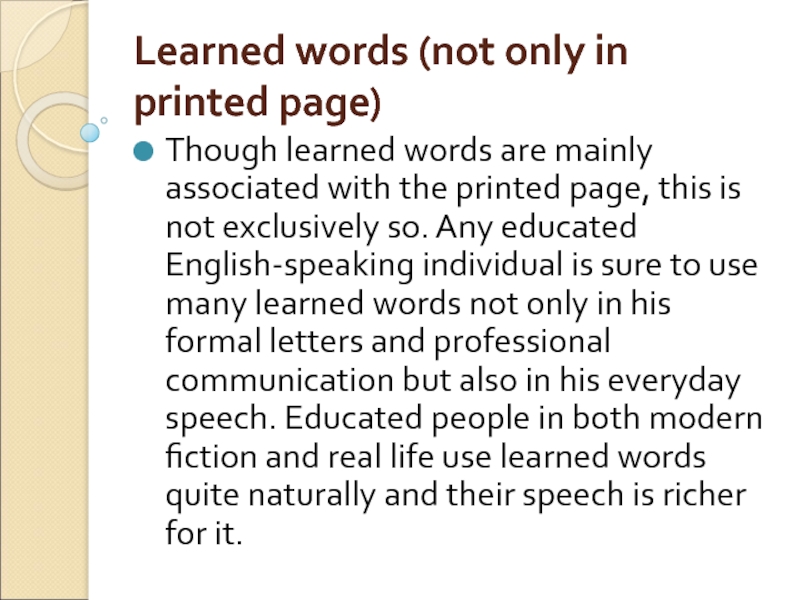
Слайд 66Learned words
But on the other hand, utterances overloaded with such words
are absurd and ridiculous.
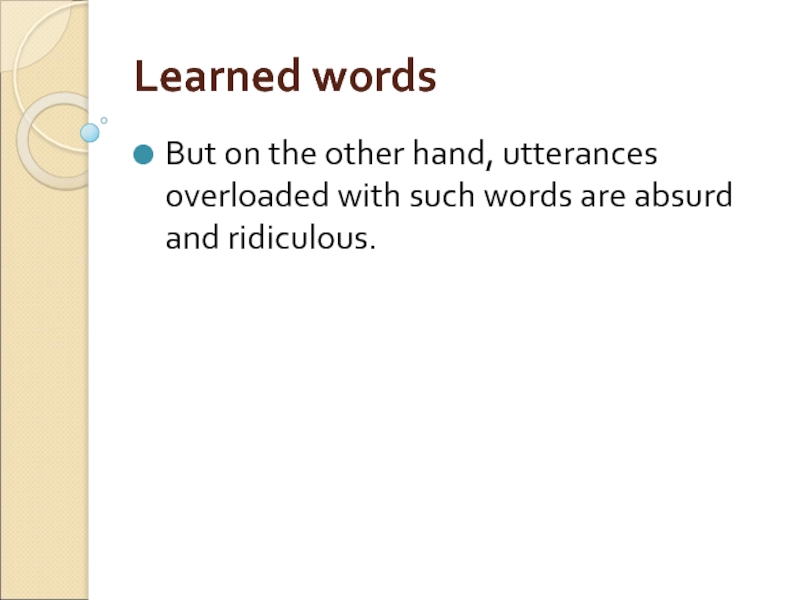
Слайд 67Learned words and Writers
Writers use this phenomenon for stylistic purposes.
When a character in a book or in a play uses too many learned words, the obvious inappropriateness of his speech in an informal situation produces a comic effect.
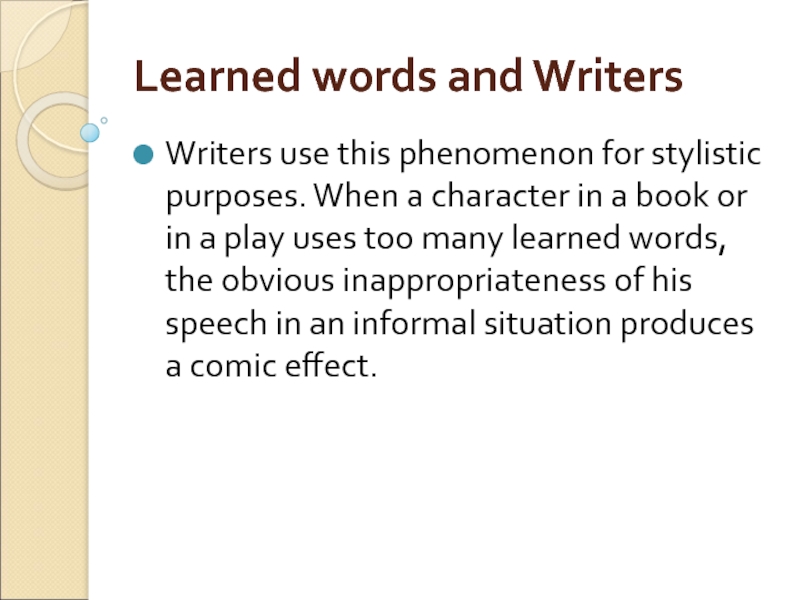
Слайд 68Learned words
However any suggestion that learned words are suitable only for
comic purposes, would be quite wrong. It is in this vocabulary stratum that writers and poets find their most vivid paints and colours, and not only their humorous effects.
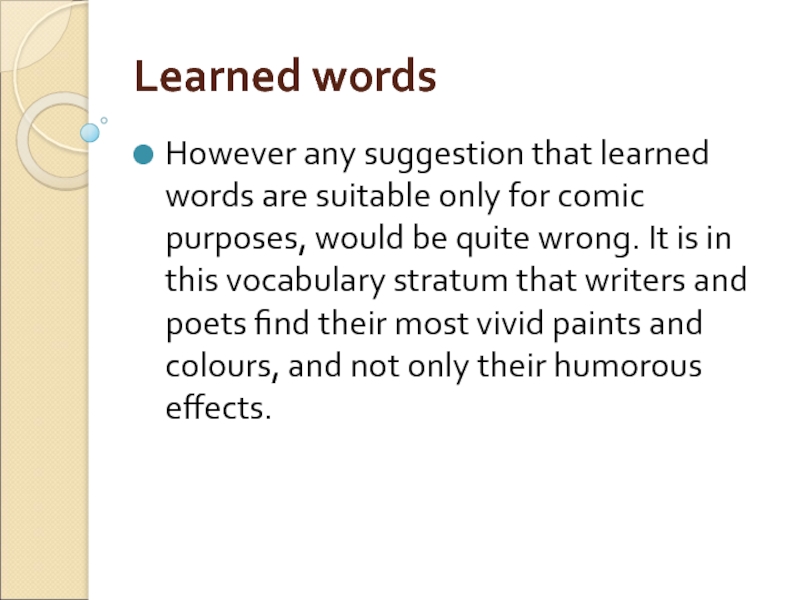
Слайд 69Learned words
It is also true that some of these words should
be carefully selected and “activized” to become part of the students’ functional vocabulary.
Without knowing some learned words, it is even impossible to read fiction (not to mention scientific articles) or to listen to lectures in the foreign language.
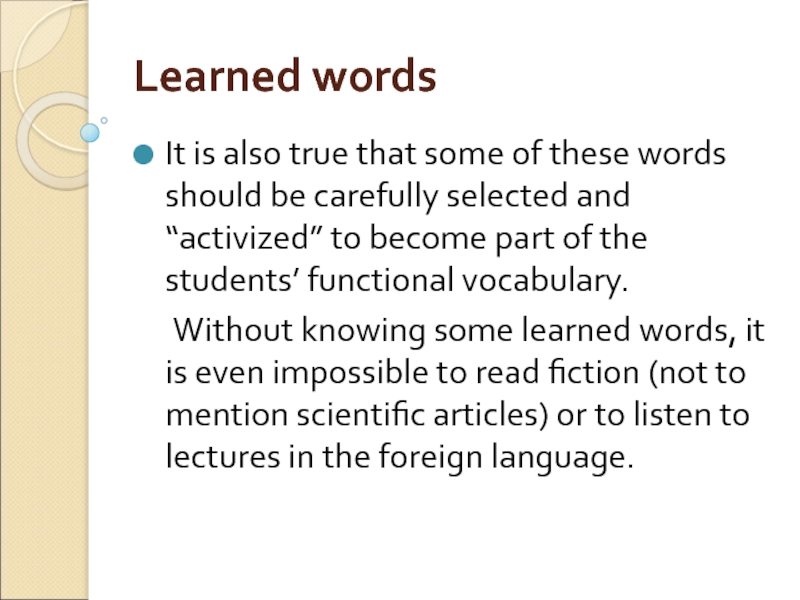
Слайд 709.Archaic and obsolete words
Archaic – are old and no longer used
words;
obsolete – no longer used because something new was invented. Obsolete words have completely gone out of use.
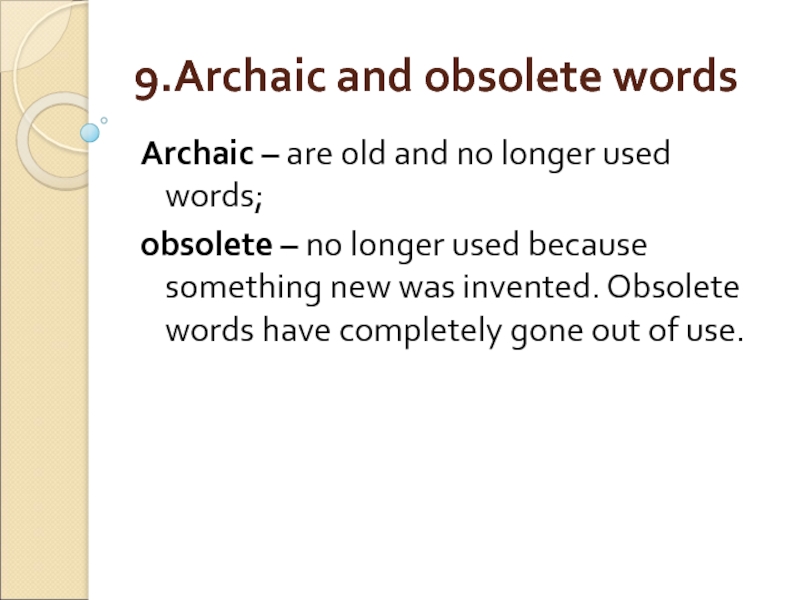
Слайд 71Archaic words
are restricted to the printed page. These words are already
partly or fully out of circulation. They are used in historical novels and in poetry which is rather conservative in its choice of words.
Thou [θаu] – (ты) and thy [ðai] – (твой), aye [ai] – (‘yes’) and nay [nei] – (‘no’) are certainly archaic and long since rejected by common usage, yet poets use them even today.
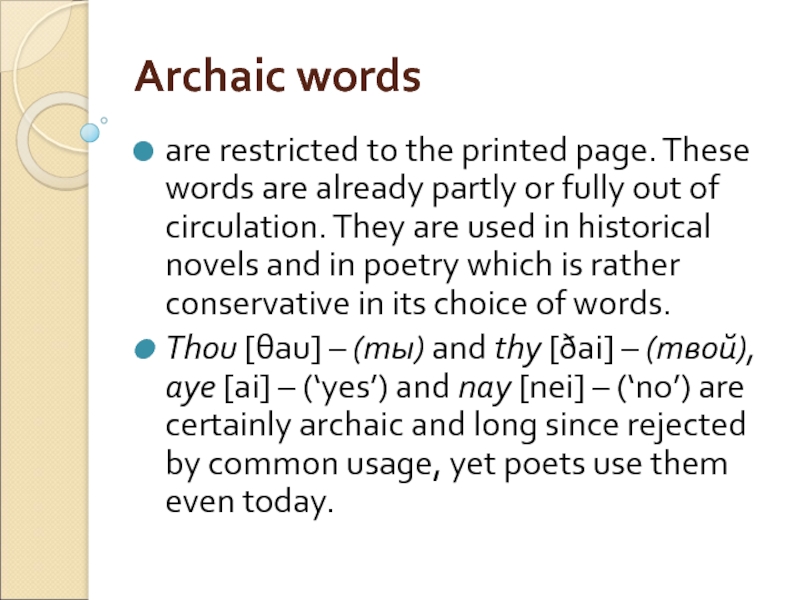
Слайд 72Archaic words
Numerous archaisms can be found in Shakespeare, but it should
be taken in consideration that what appear to us today as archaisms in the works of Shakespeare, are in fact examples of everyday language of Shakespeare`s time.
Further examples of archaisms are: morn (for morning), eve (for evening), errant (for wandering, e.g. errant knights), etc.
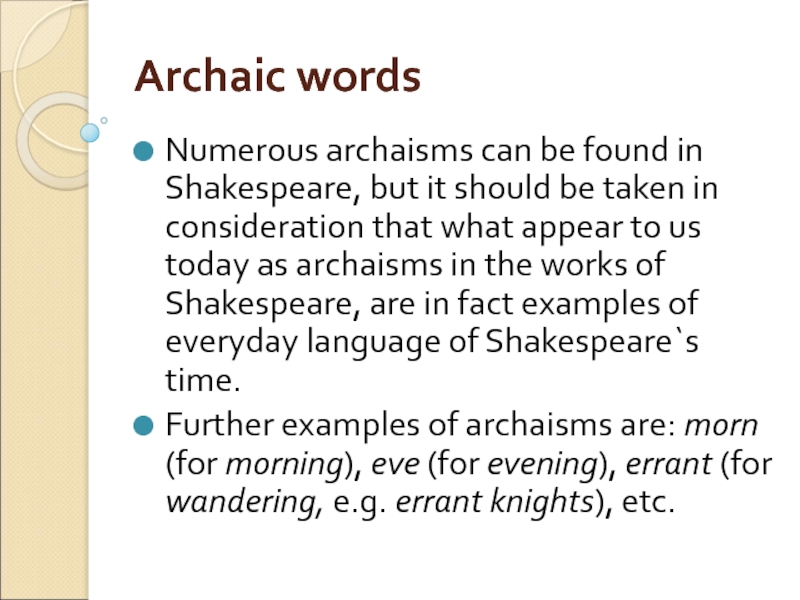
Слайд 73Archaic words
Sometimes an archaic word may undergo a sudden revival. So,
the formerly archaic kin (for relatives; one`s family) is now current in American usage.
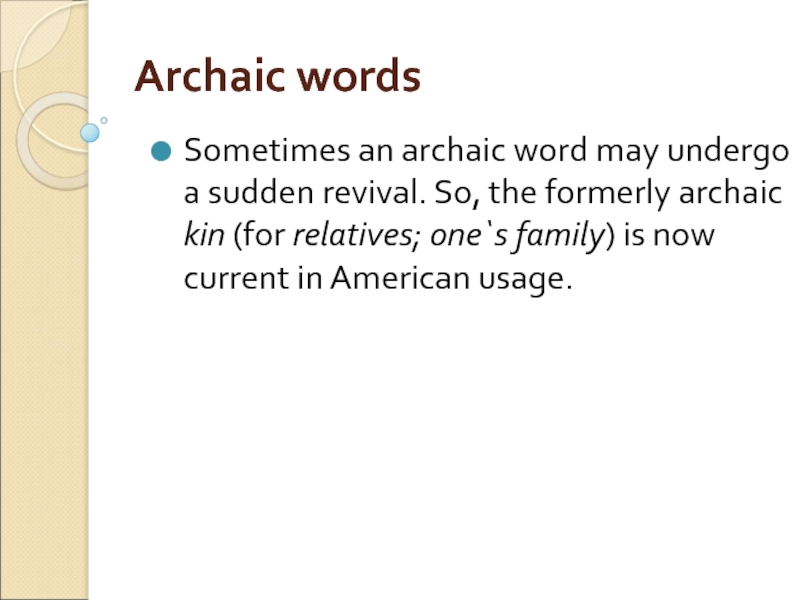
Слайд 7410.Professional terminology
Every field of modern activity has its specialized vocabulary, and
similarly special terminologies for psychology, music, management, finance, economics, jurisprudence, linguistics and many others.
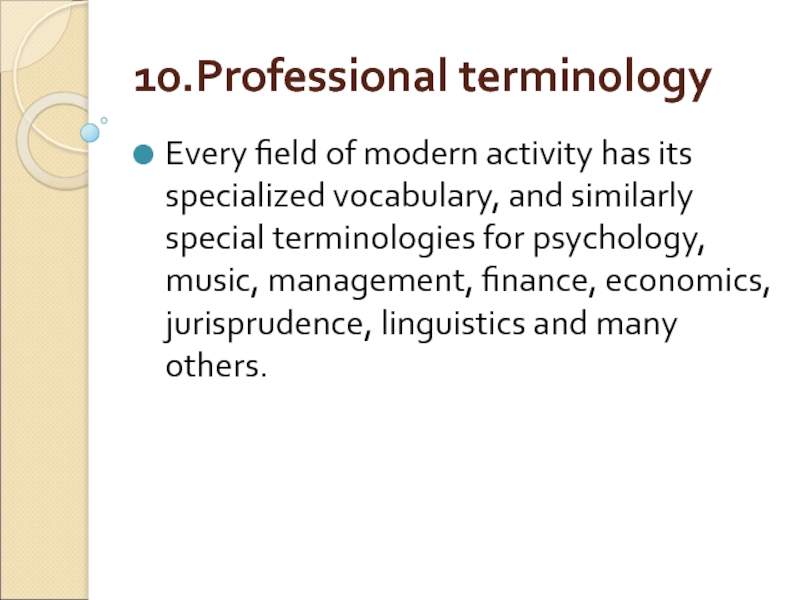
Слайд 75Professional terminology
Term, as traditionally understood, is a word or a word-group
which is specifically employed by a particular branch of science, technology, trade or the arts to convey a concept peculiar to his particular activity.
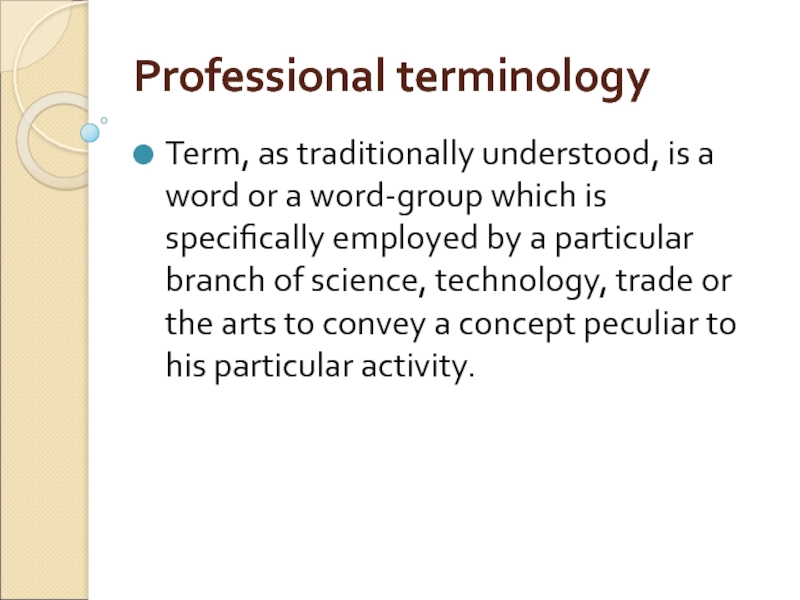
Слайд 76Professional terminology
So, share, bank, balance sheet are finance terms;
court, lawyer,
civil law are legal terms; and top manager, creative team, motivation are used in management. Bilingual, interdental, labialization, palatalization, glottal stop, descending scale are terms of theoretical phonetics.
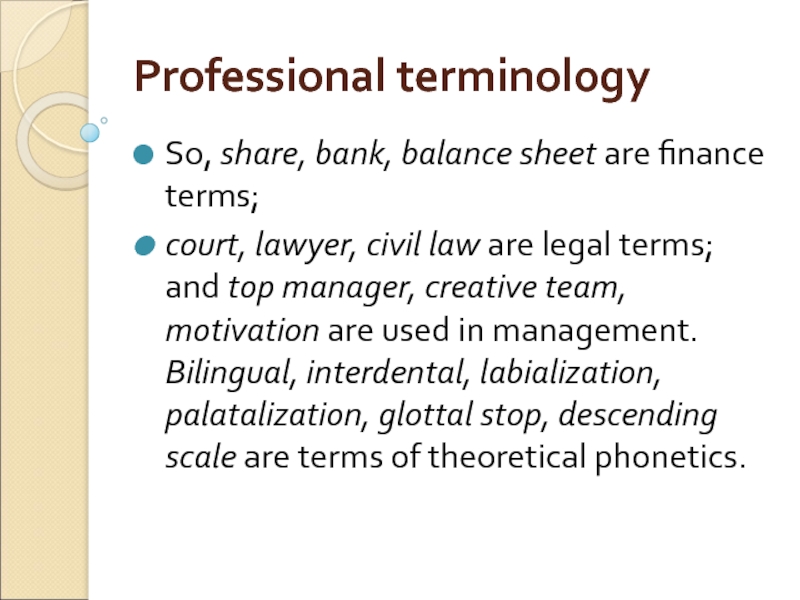
Слайд 77controversial problems in the field of terminology.
a term loses its
terminological status
It is quite natural that under circumstances numerous terms pass into general usage without losing connection with their specific fields.
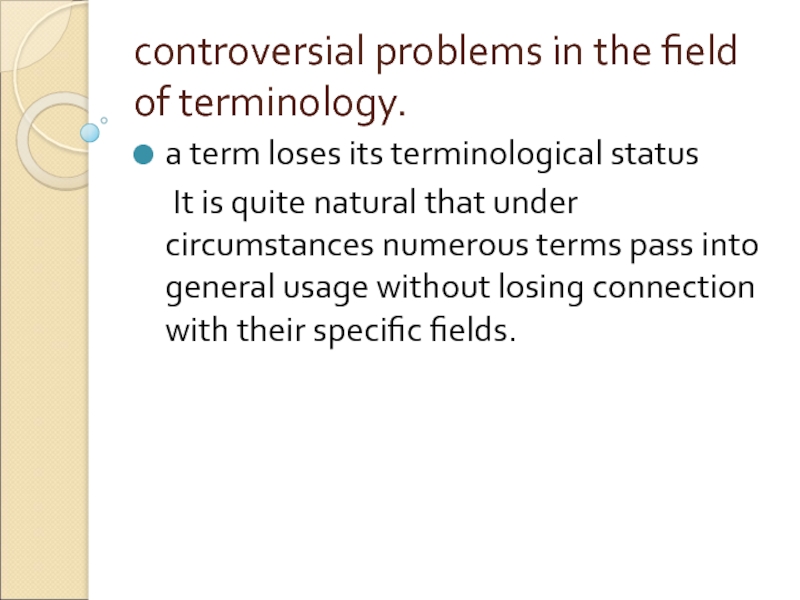
Слайд 78Professional terminology
There are linguists in whose opinion terms are only those
words which have retained their exclusiveness and are not known or recognized outside their specific sphere. From this point of view, words associated with the medical sphere, such as unit (доза лекарственного препарата), theatre (операционная), contact (носитель инфекции) are no longer medical terms as they are in more or less common usage.
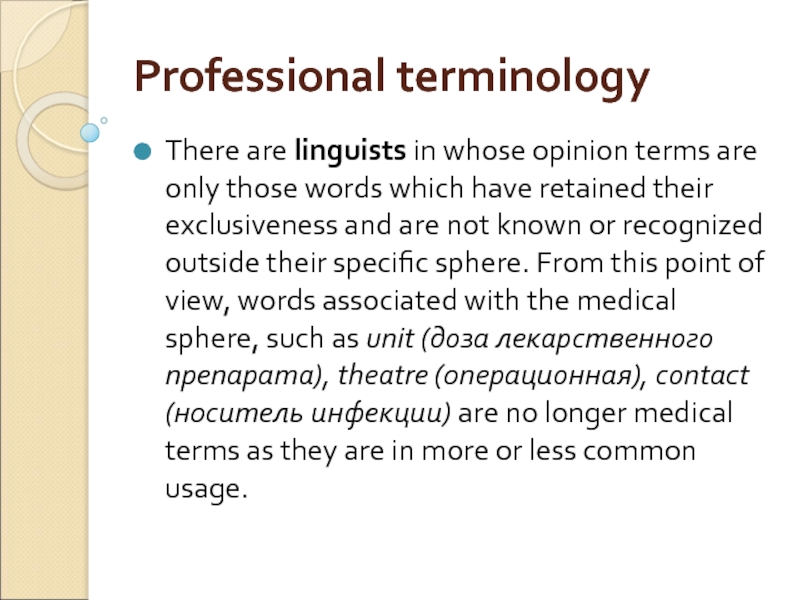
Слайд 79Professional terminology
There is yet another point of view, according to which
any terminological system is supposed to include all the words and word-groups conveying concept peculiar to a particular branch of knowledge, regardless of their exclusiveness. It would be wrong to regard a term as something “special” and standing apart.
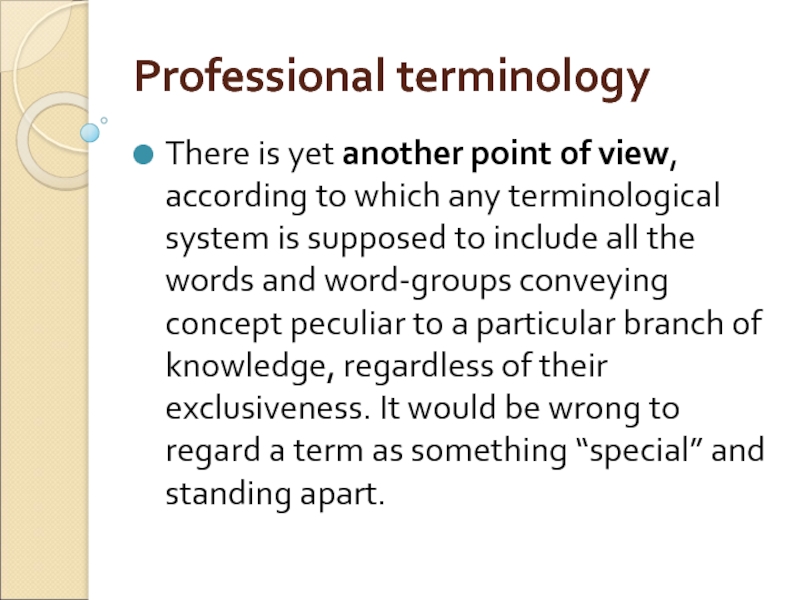
Слайд 80polysemy and synonymy
According to some linguists, an “ideal” term should
be monosemantic (i.e. it should have only one meaning). Polysemantic terms may lead to misunderstanding, and that is a serious shortcoming in professional communication. This requirement seems quite reasonable, yet facts of the language do not meet it. There are numerous polysemantic terms.
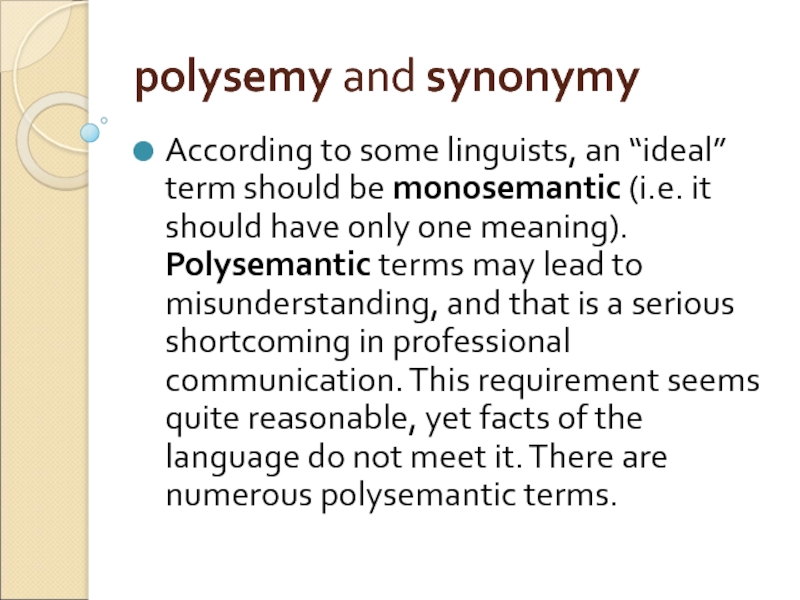
Слайд 81synonymy
The same is true about synonymy in terminological systems. There are
scholars who insist that terms should not have synonyms because, consequently, scientists and other specialists would name the same objects and phenomena in their field by different terms and would not be able to come to any agreement. This may be true. But, in fact, terms do possess synonyms.
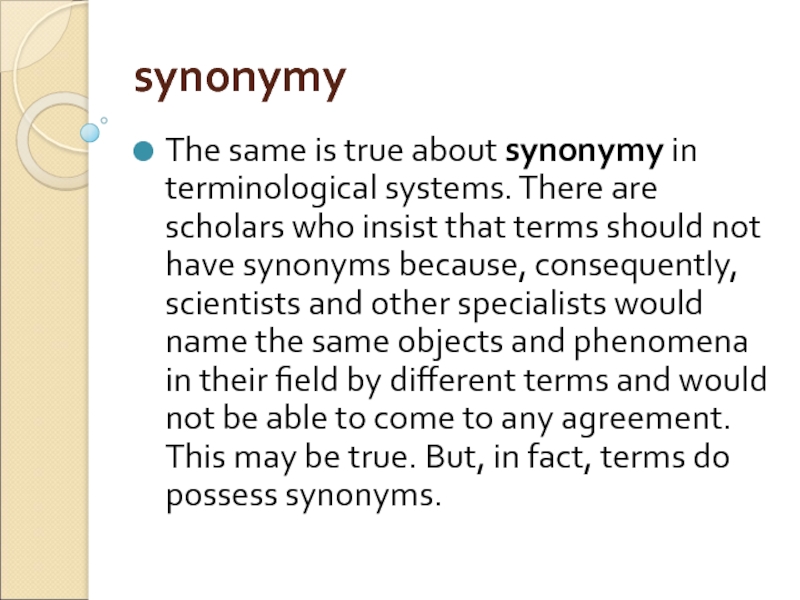
Слайд 8210.Basic vocabulary
are stylistically neutral,
used them in all kinds of situations,
both formal and informal, in verbal and written communication
are used every day, everywhere and by everybody, regardless of profession, occupation, educational level, age group or geographical location.
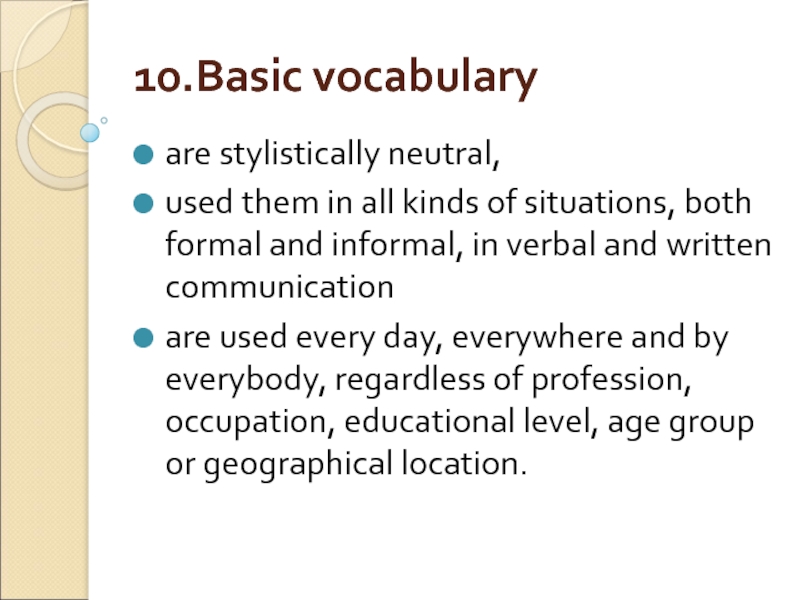
Слайд 83Basic vocabulary
without them no human communication would be possible as they
denote objects and phenomena of everyday importance (e.g. house, bread, summer, child, mother, difficult, to go, etc.).
is the central group of the vocabulary, its historical foundation and living core.
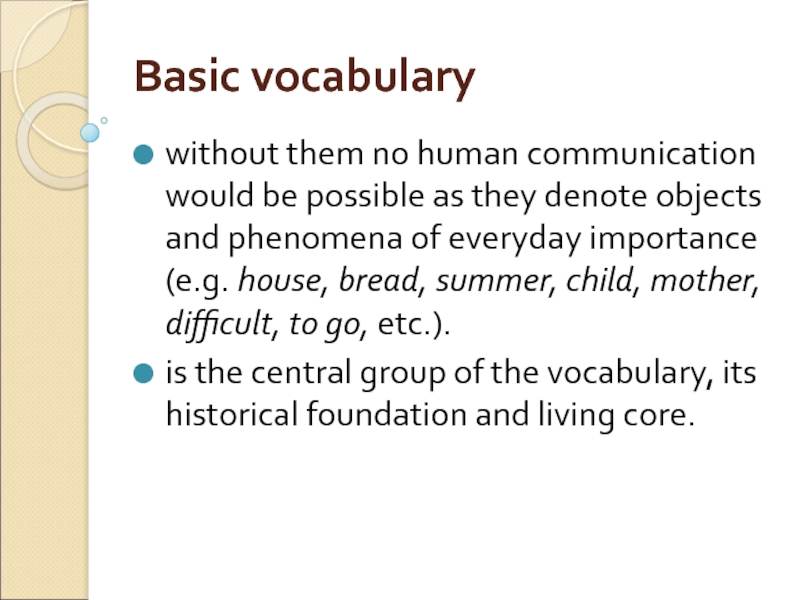
Слайд 84Basic vocabulary
Basic vocabulary words can be recognized not only by their
stylistic neutrality but, also, by lack of other connotations (i.e. attendant meanings). Their meanings are broad, general and directly convey the concept, without supplying any additional information.
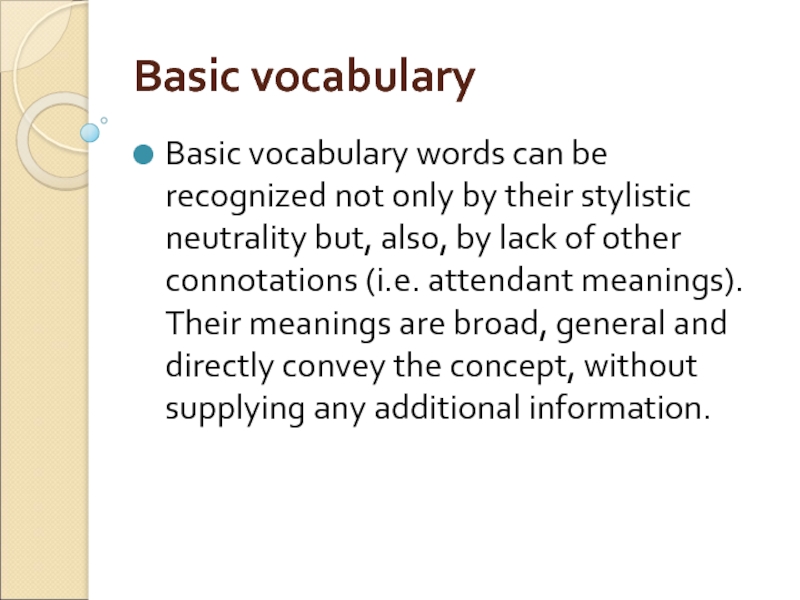
Слайд 85Basic vocabulary
For instance, the verb to walk means merely ‘to move
from place to place on foot’ whereas in the meanings of its synonyms to stride (шагать), to stroll (прогуливаться), to trot (семенить, бежать вприпрыжку), to stagger – to sway while walking (идти шатаясь) and others, some additional information is encoded as they each describe a different manner of walking, a different gait, tempo, purpose or lack of purpose.
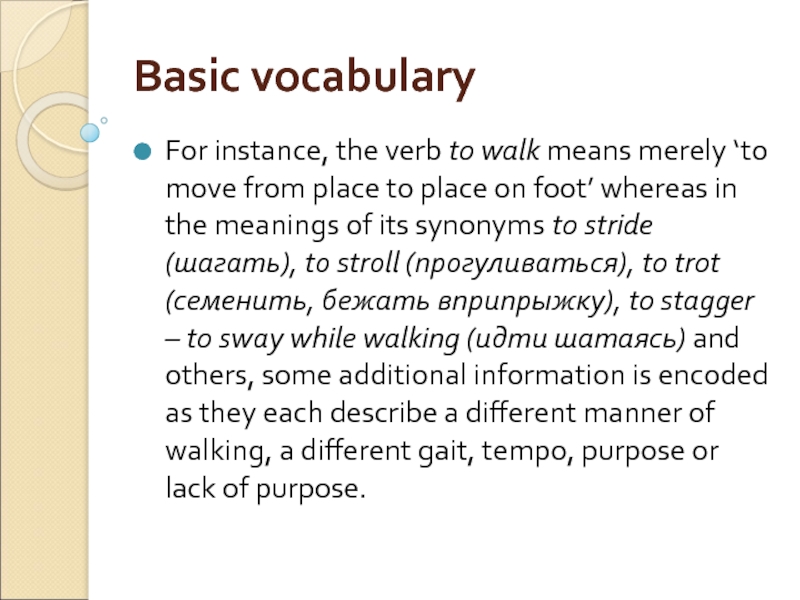
Слайд 86Basic vocabulary
Basic vocabulary 1.begin, 2.continue 3.end 4.child, baby
Informal 1.start, get started
2.go on, get on 3.finish, be through, be over 4.kid, brat, bairn (dial.),
Formal 1.commence 2.proceed 3. terminate 4.infant, babe
